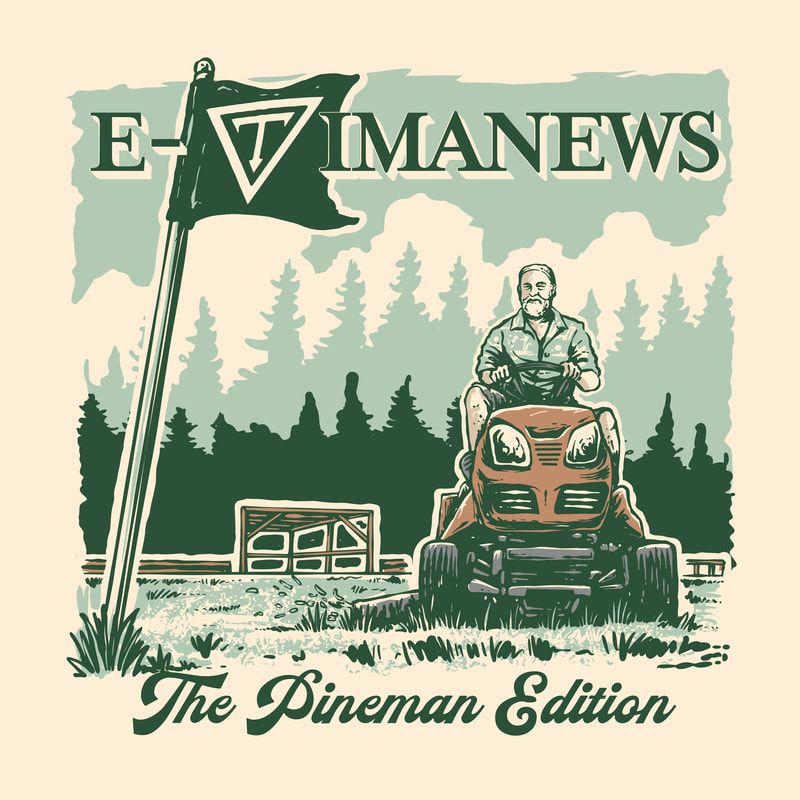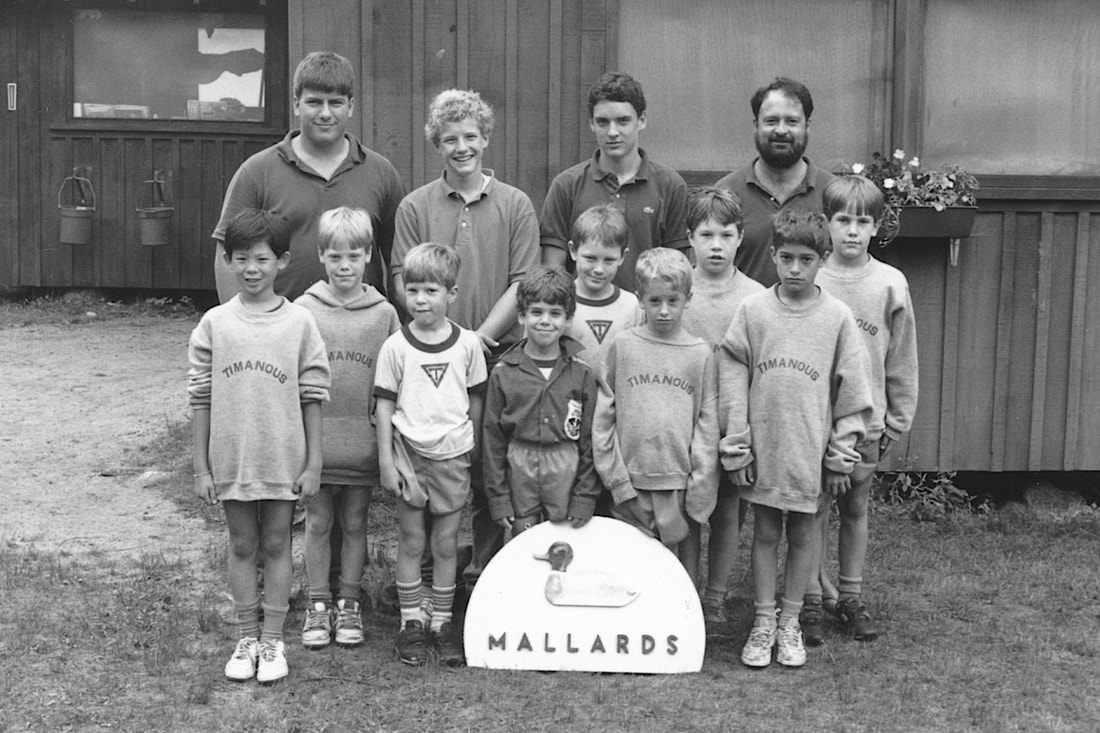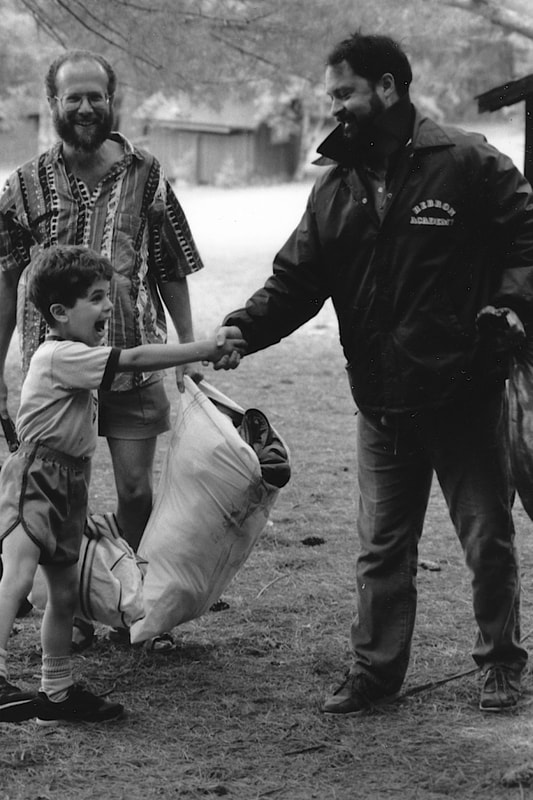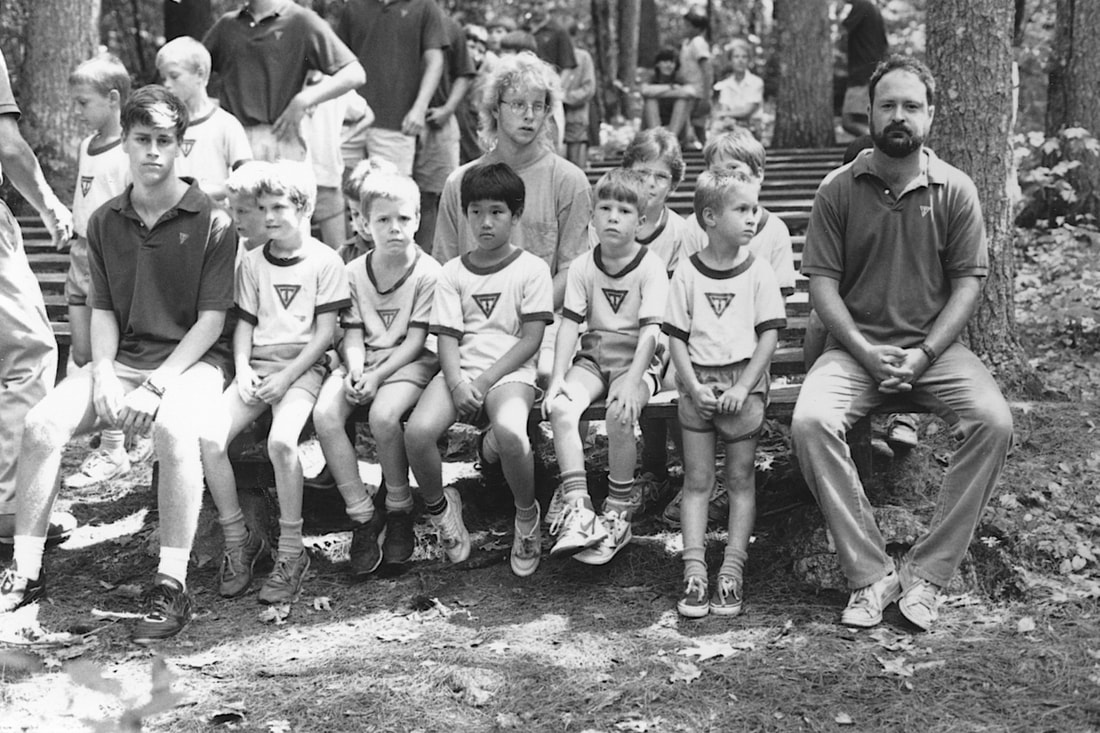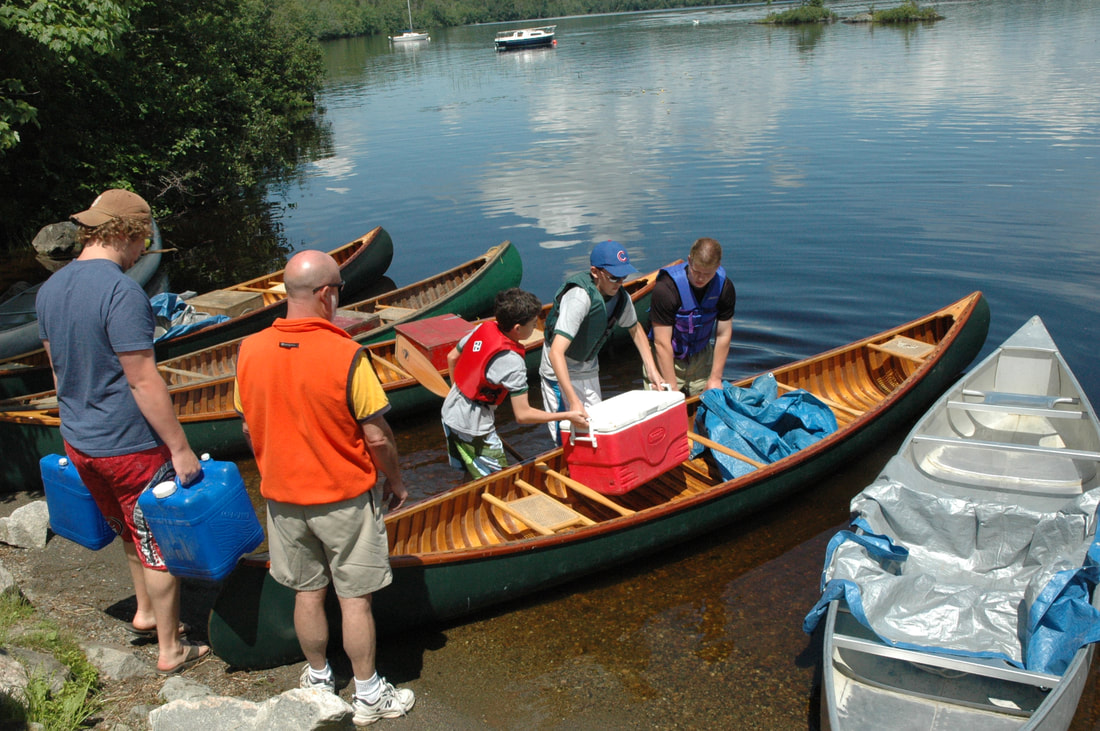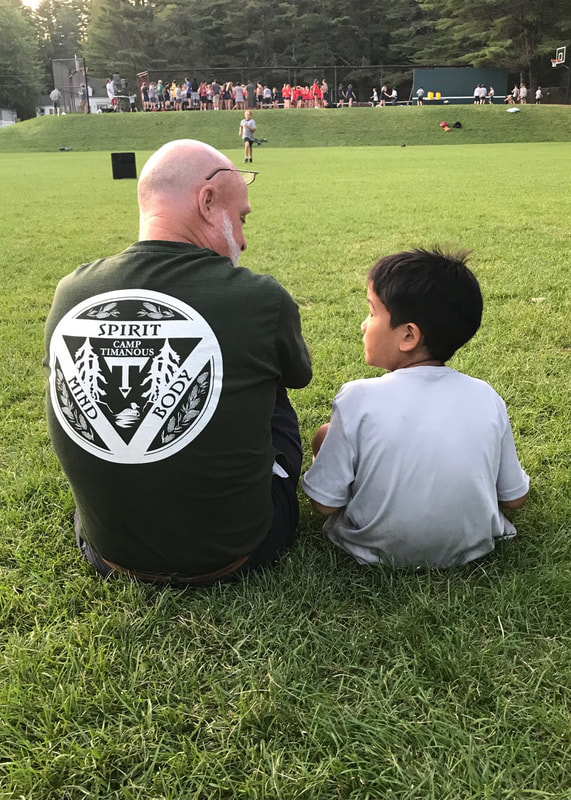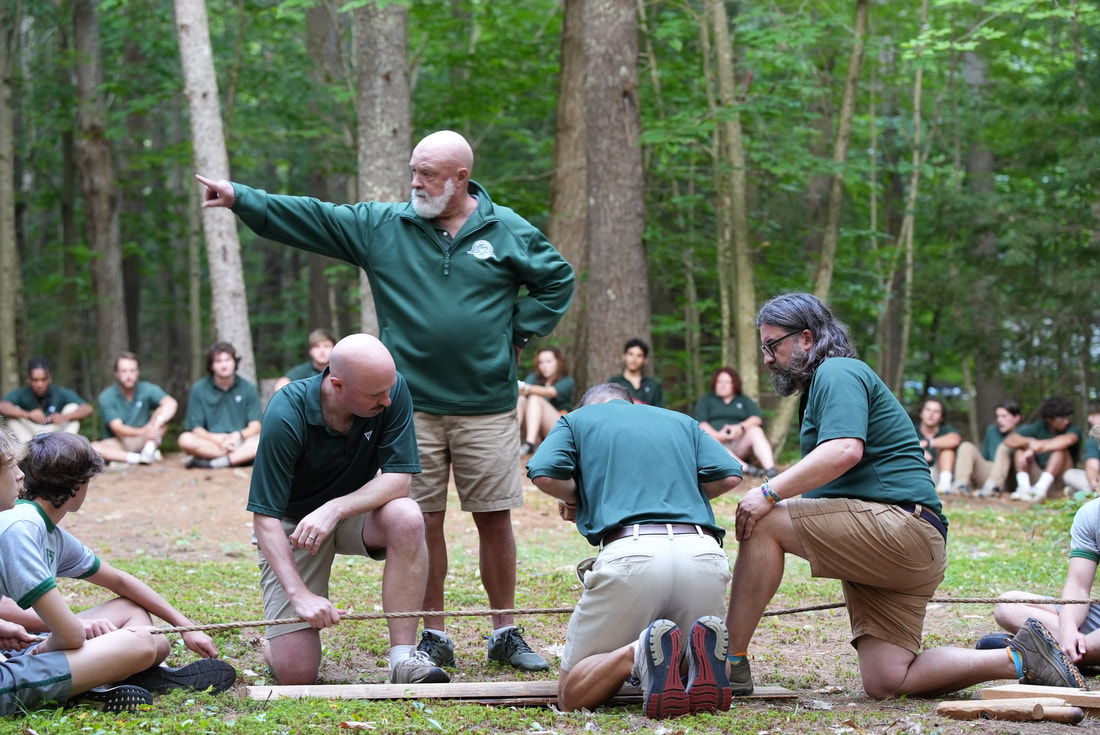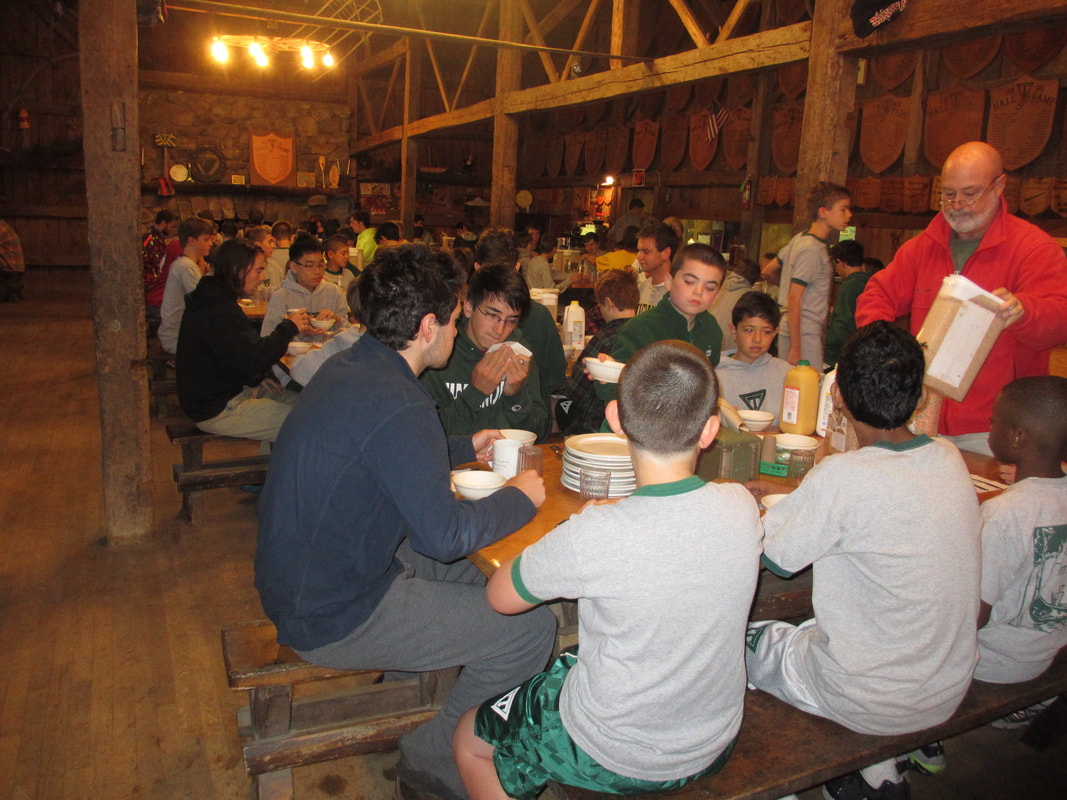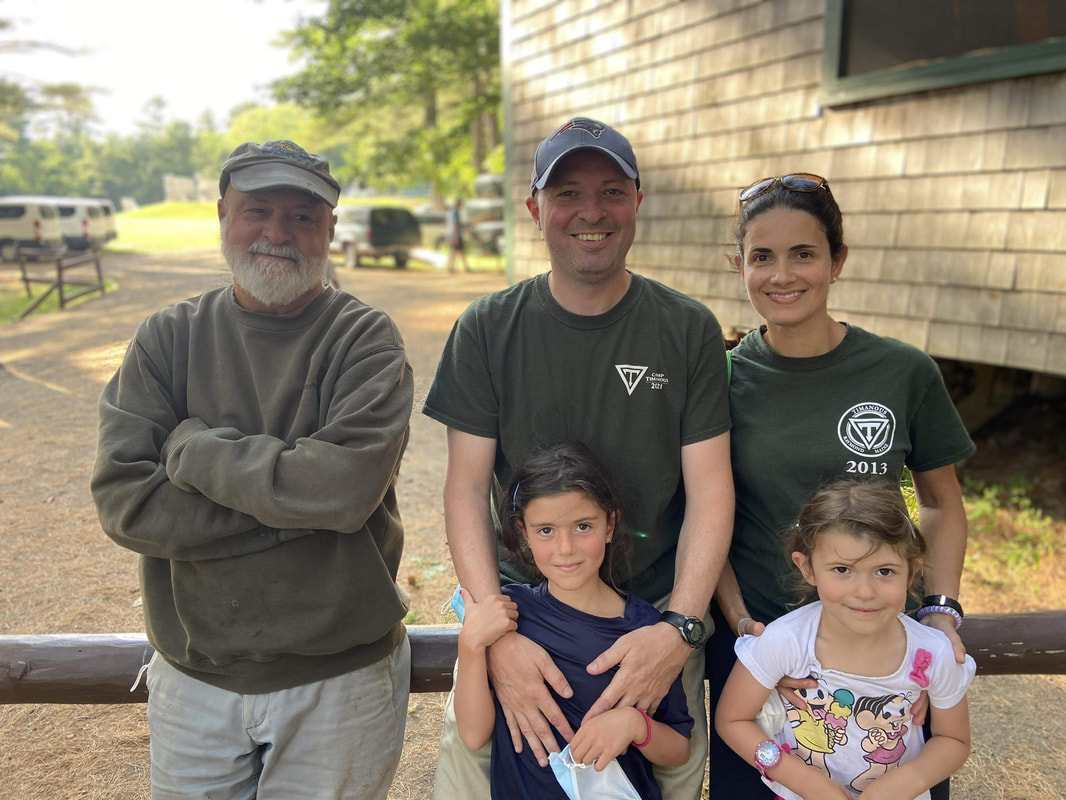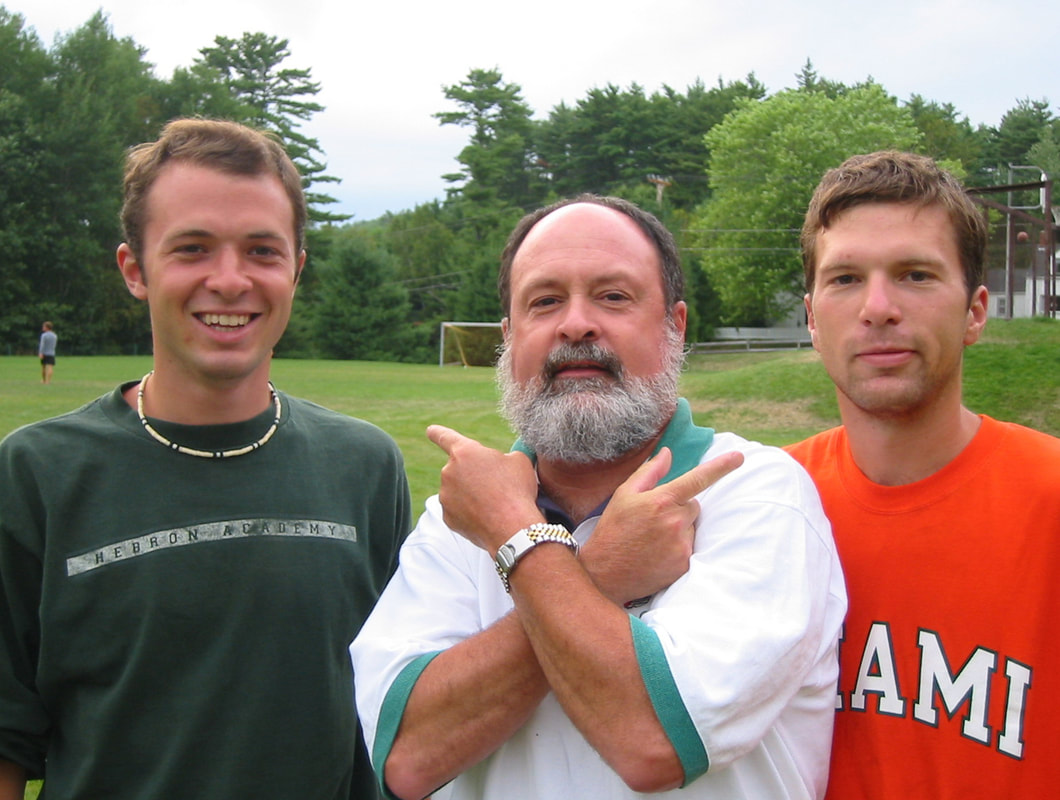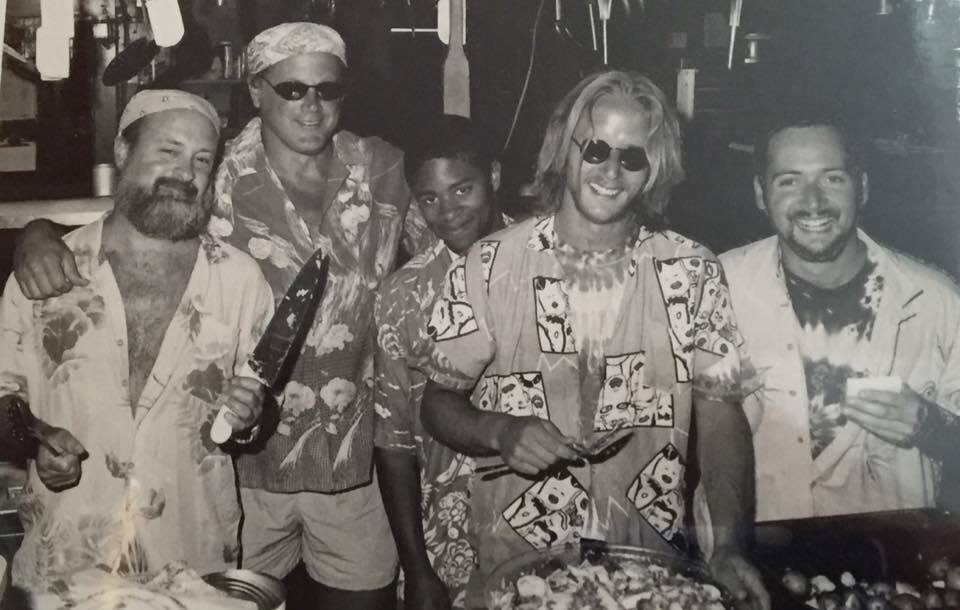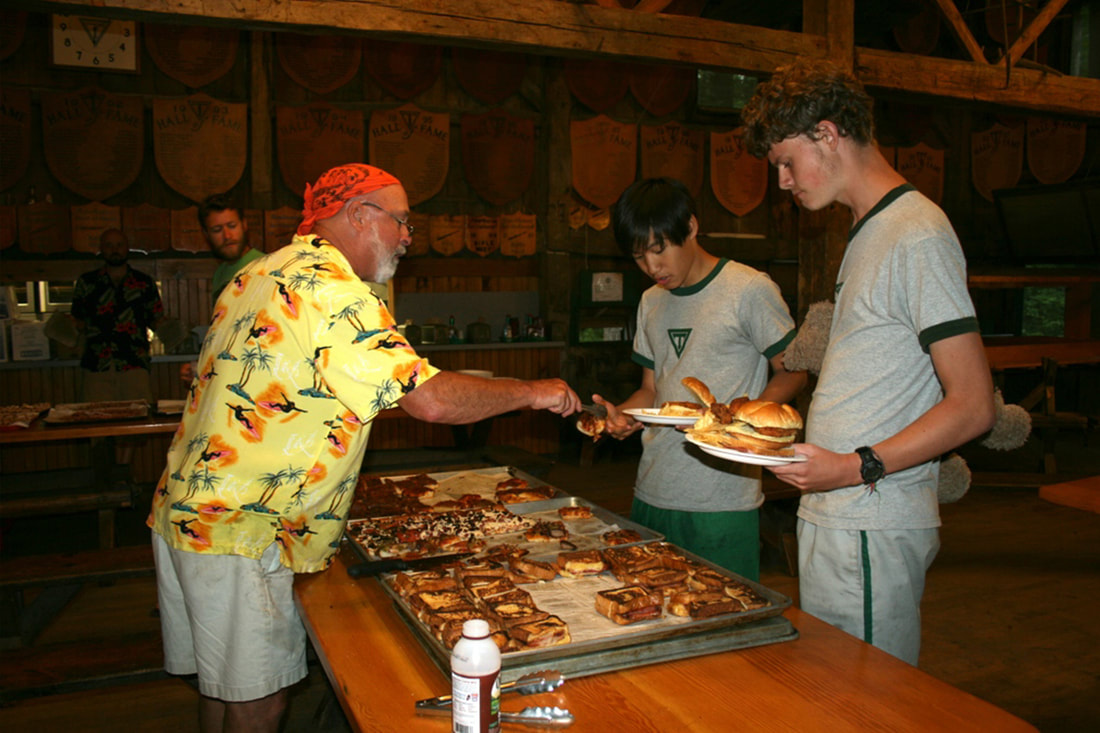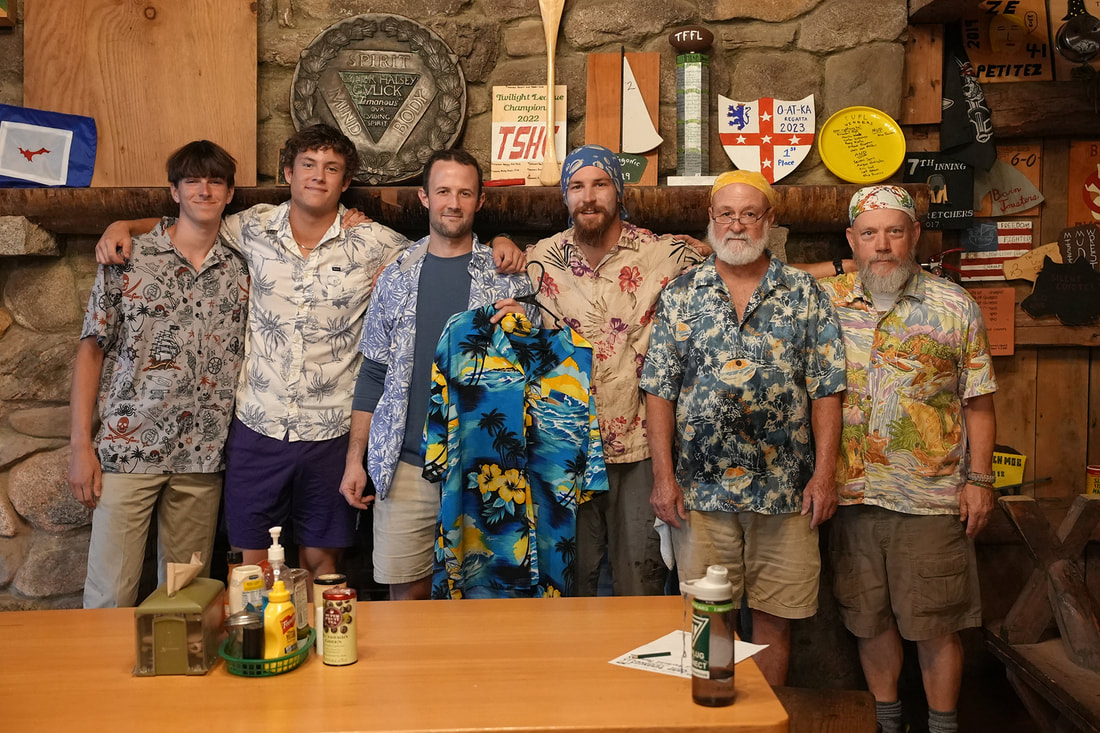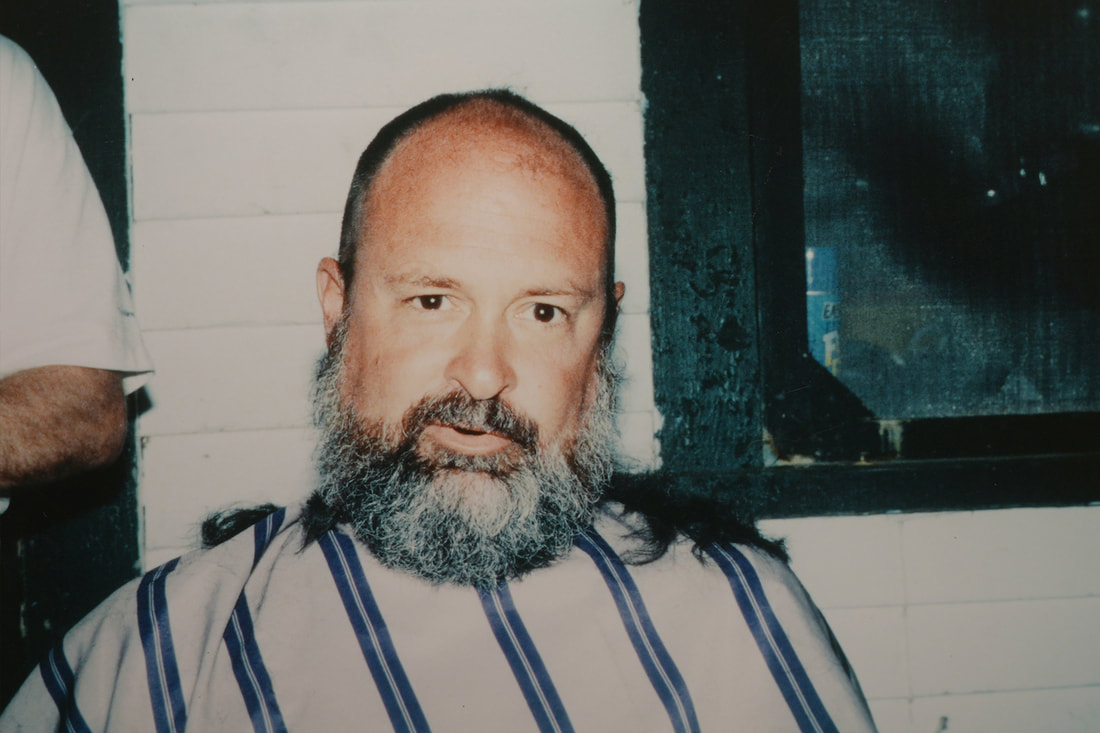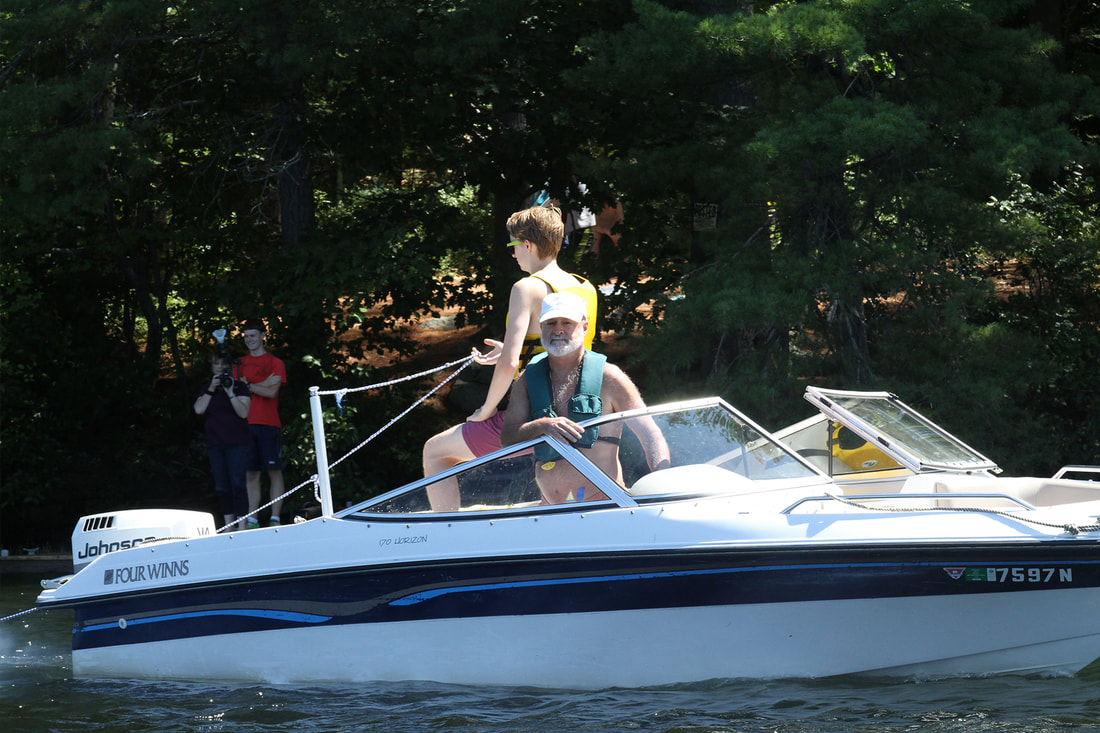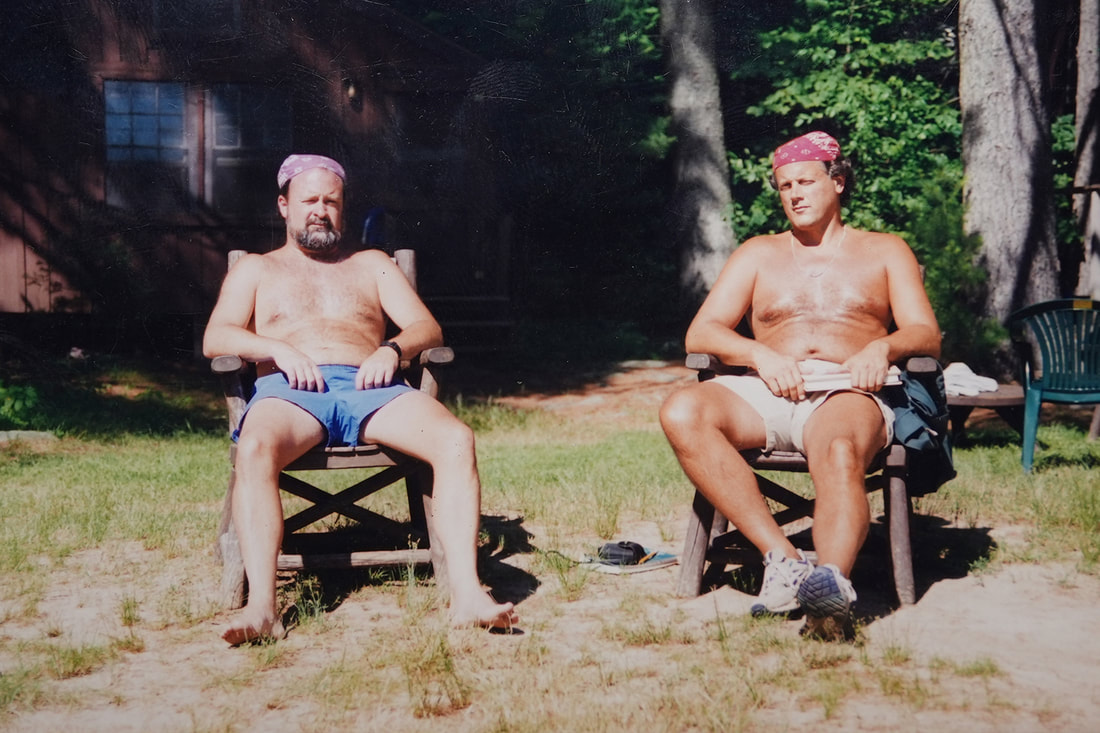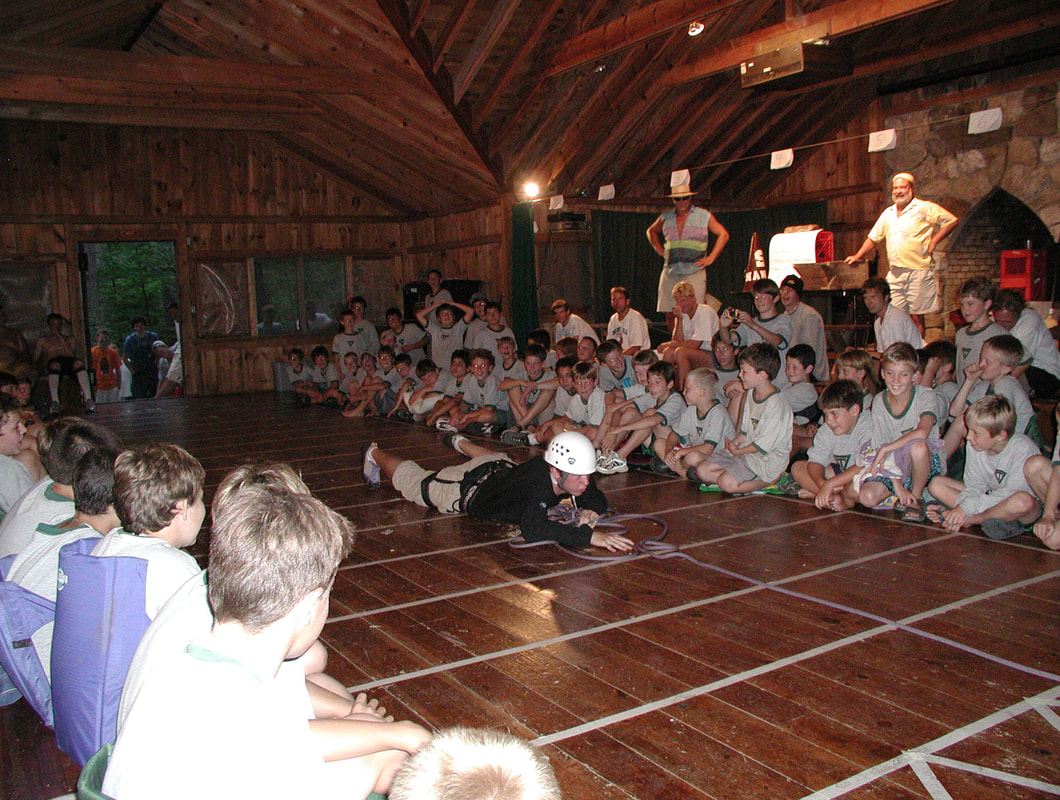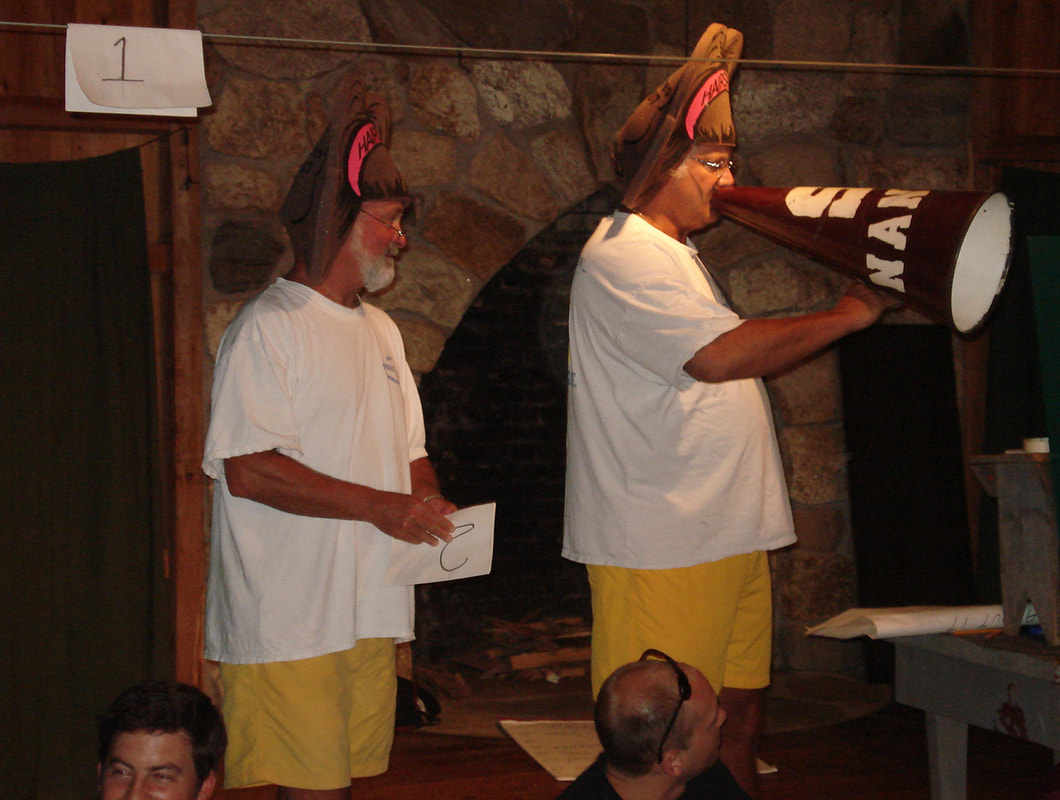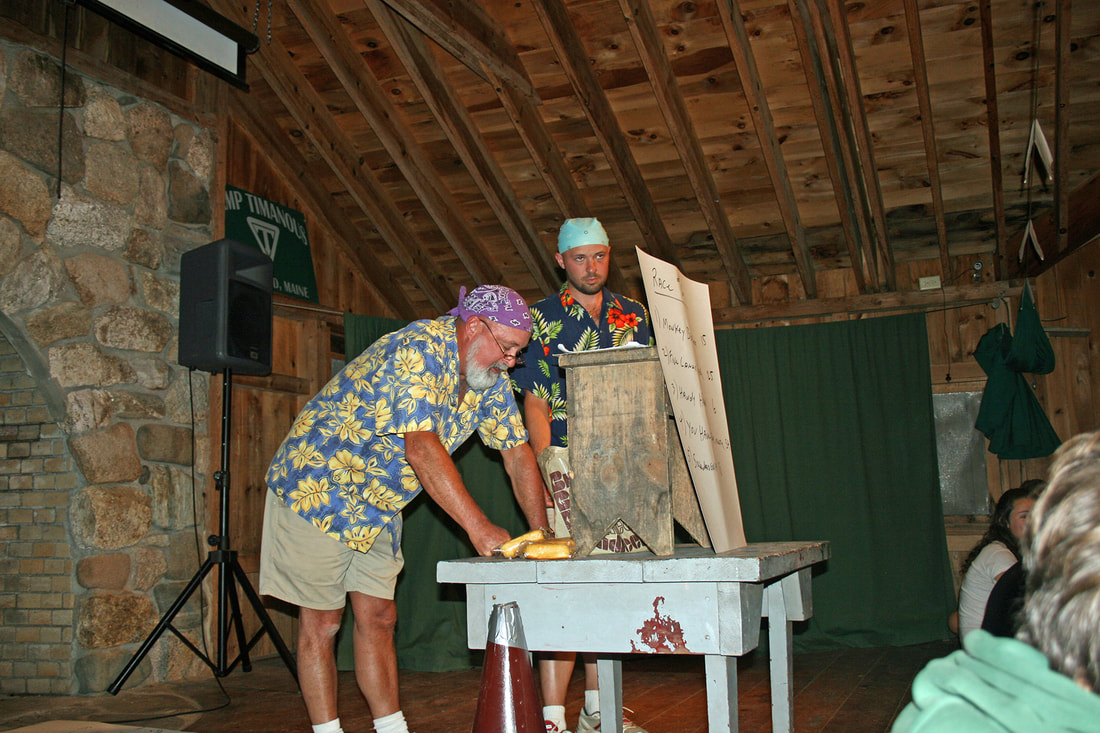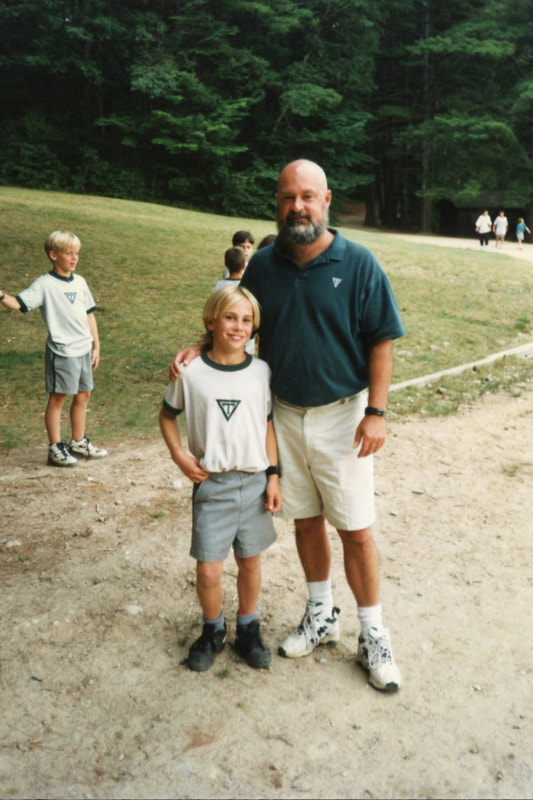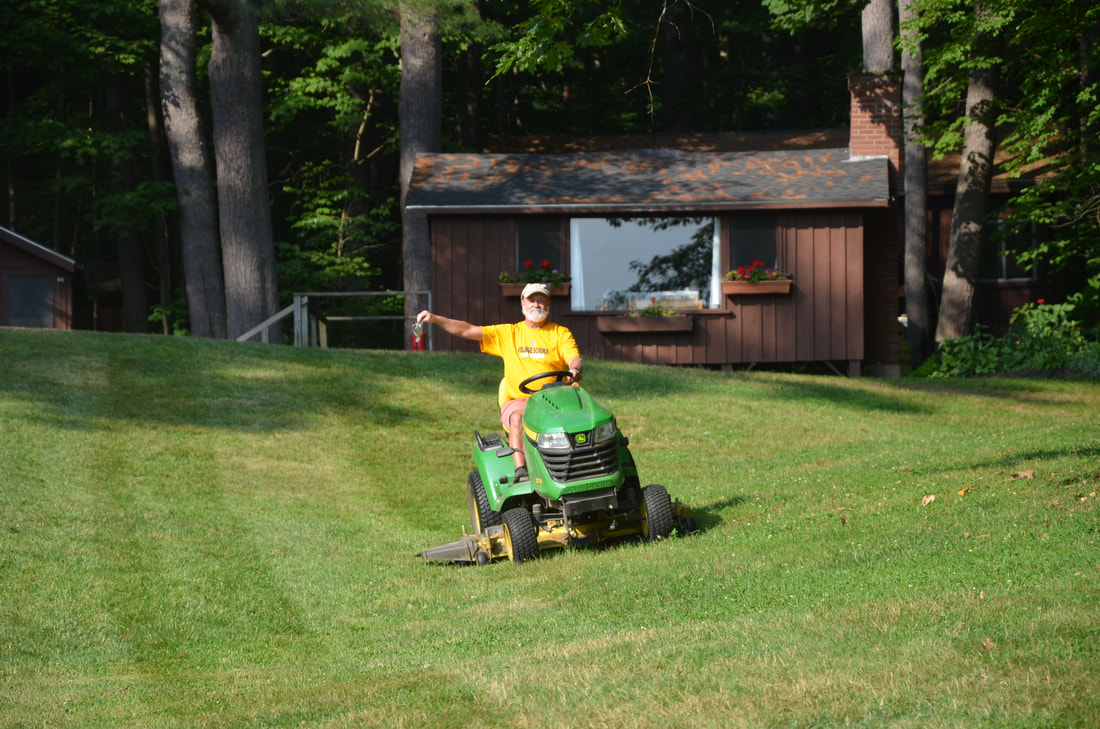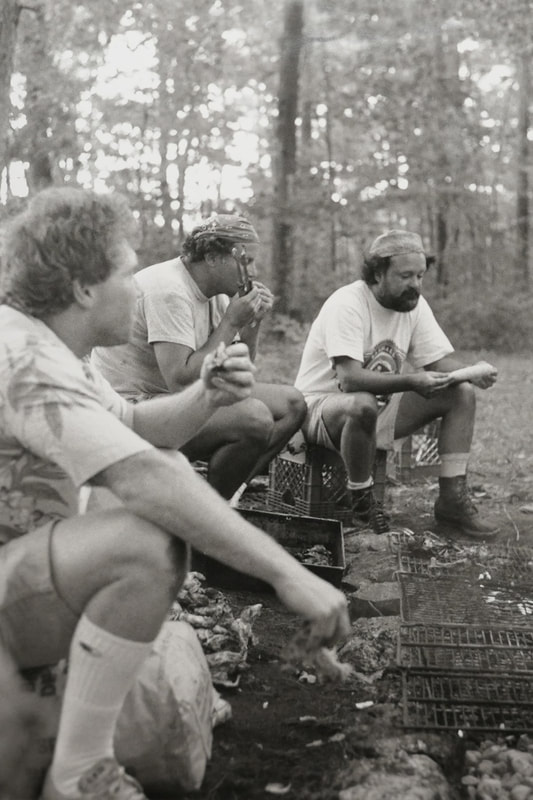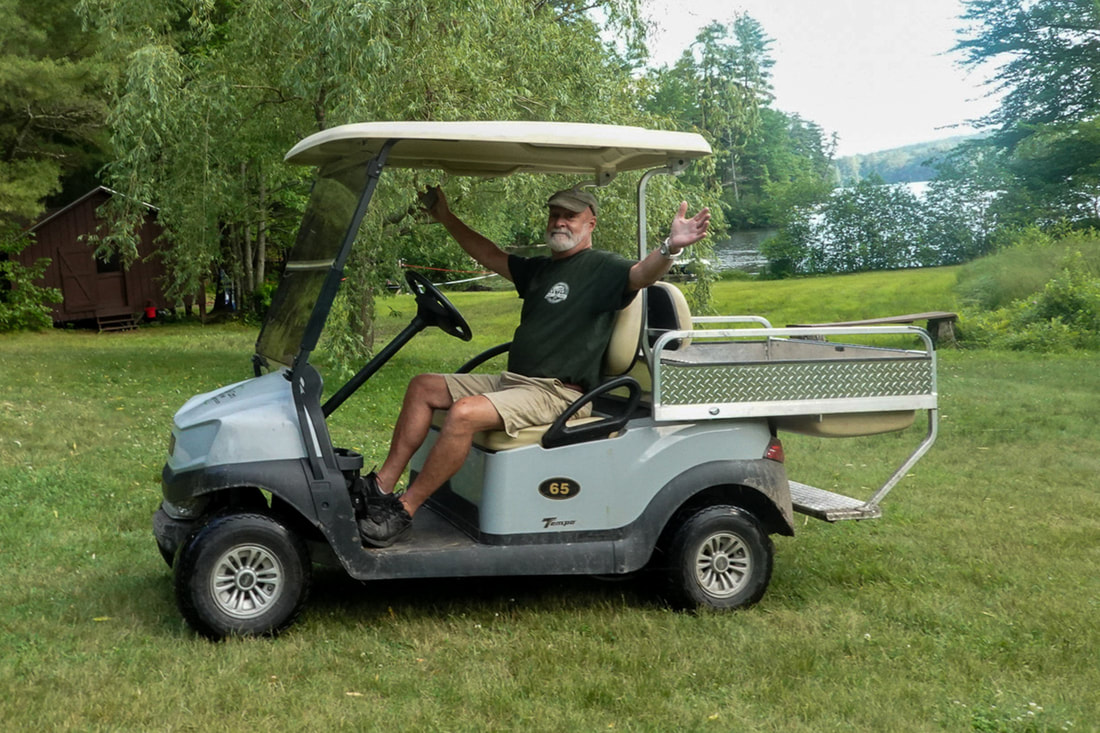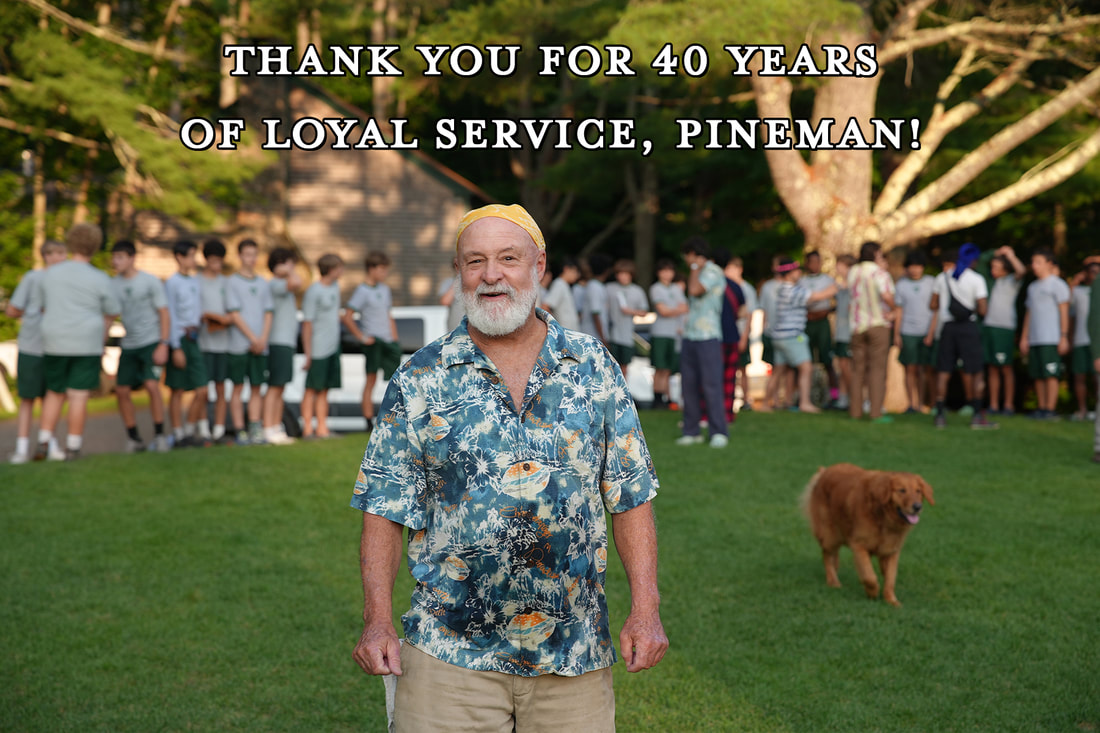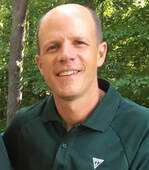Schoder: You ready Pine?
Pineman: You know it, big dog.
Schoder: Let’s do it. How did you find camp?
Pineman: Kathy and I had sold our McDonald's on St. Thomas. We moved to Maine and started working at Hebron Academy where my dad was the head of school. Jack and Dave Suitor were both working there too, and at some point, Jack said, “Pine, we have this camp down in Raymond. Why don't you and Kathy come down and check us out. We'll put you in the youngest cabin in Mallards.” So that’s what happened. And then–nine years in Mallard's, one year in Brooks' cabin, a bunch of years up where Nick lives now, and now at Sandy's cabin. And here we are today.
Schoder: That’s surprising to me–when I was a camper, the story was that you just appeared one day from the pine trees at Beginner's Beach near Red River.
Pineman: (laughs)
Pineman: You know it, big dog.
Schoder: Let’s do it. How did you find camp?
Pineman: Kathy and I had sold our McDonald's on St. Thomas. We moved to Maine and started working at Hebron Academy where my dad was the head of school. Jack and Dave Suitor were both working there too, and at some point, Jack said, “Pine, we have this camp down in Raymond. Why don't you and Kathy come down and check us out. We'll put you in the youngest cabin in Mallards.” So that’s what happened. And then–nine years in Mallard's, one year in Brooks' cabin, a bunch of years up where Nick lives now, and now at Sandy's cabin. And here we are today.
Schoder: That’s surprising to me–when I was a camper, the story was that you just appeared one day from the pine trees at Beginner's Beach near Red River.
Pineman: (laughs)
Schoder: Describe one of your favorite camp memories.
Pineman: There are a lot of fond memories. That which gives me the most pause or makes me smile the most is when I think about how many campers and counselors I've worked with through the years.
The common denominator continues to be their smiles when they come back to camp and they see each other after being away for eight or nine months. You know–a lot has changed in 40 years–cell phones and email didn't exist. And so today, our campers and counselors are able to stay in touch with each other daily.
That said, the smiles, the hugs, the happiness has not changed. When they come back to camp–when we get back to camp–it's like we've never left. It's like we've been with each other every day for the time that we've been away from camp. That's not really a memory because it’s a constant, but it’s one of my favorite things to think about.
And we can even extend it a little further. It's the mom and dad's. They see it in their kids. They live with their kids, and they see their kids building enthusiasm and excitement as we get closer to the opening of camp. And so I think, you know, whatever we're doing, I wish we could bottle it and send it out to the world.
Pineman: There are a lot of fond memories. That which gives me the most pause or makes me smile the most is when I think about how many campers and counselors I've worked with through the years.
The common denominator continues to be their smiles when they come back to camp and they see each other after being away for eight or nine months. You know–a lot has changed in 40 years–cell phones and email didn't exist. And so today, our campers and counselors are able to stay in touch with each other daily.
That said, the smiles, the hugs, the happiness has not changed. When they come back to camp–when we get back to camp–it's like we've never left. It's like we've been with each other every day for the time that we've been away from camp. That's not really a memory because it’s a constant, but it’s one of my favorite things to think about.
And we can even extend it a little further. It's the mom and dad's. They see it in their kids. They live with their kids, and they see their kids building enthusiasm and excitement as we get closer to the opening of camp. And so I think, you know, whatever we're doing, I wish we could bottle it and send it out to the world.
Schoder: What's your favorite chapel song and why?
Pineman: My favorite Chapel song is Woody Guthrie’s “This Land is Your Land,” and you're going to laugh at why it's my favorite song.
You have to remember that I used to live in the Virgin Islands. You may not know that Congo also lived on St. Thomas many years ago. And I was standing next to Congo one chapel, and there is a line in the song “from the New York Islands to the Redwood Forest,” and Congo sings it “from the Virgin Islands to the Redwood Forest.” So ever since I heard that, that's how I sing that song. I thought that was the greatest thing in the world.
Pineman: My favorite Chapel song is Woody Guthrie’s “This Land is Your Land,” and you're going to laugh at why it's my favorite song.
You have to remember that I used to live in the Virgin Islands. You may not know that Congo also lived on St. Thomas many years ago. And I was standing next to Congo one chapel, and there is a line in the song “from the New York Islands to the Redwood Forest,” and Congo sings it “from the Virgin Islands to the Redwood Forest.” So ever since I heard that, that's how I sing that song. I thought that was the greatest thing in the world.
Schoder: You’ve driven camping trips to their campsites and boat launches for as long as I’ve been at camp. Do you have a favorite drive?
Pineman: You know, I didn't go on any of the camping trips except when I was in Mallard's and I would take the kids to my parents cottage on an island in Casco Bay. The trip I enjoy driving most is the Five Day up to Aziscoos because you're so far out in the woods on that one. Nothing for miles, just pure wilderness.
Funny story about that drive. There were two summers where a bridge had been washed out, so we couldn't go the way we usually go to the drop off. And that first summer, we found out the bridge was washed out, and we went all over the place trying to find a way to the boat launch. And I thought, “Man, how am I gonna find my way back out of here once we get to the boat launch?” So Aidan Prior was one of the counselors on the trip and he drew out the path we were taking, literally on a pizza box. We eventually found the drop off and I navigated my way back to camp using a pizza box. We held onto that pizza box because the next year, the bridge still wasn’t rebuilt, and we used it again! And I believe that pizza box is still hung in the Campcraft Shack.
Pineman: You know, I didn't go on any of the camping trips except when I was in Mallard's and I would take the kids to my parents cottage on an island in Casco Bay. The trip I enjoy driving most is the Five Day up to Aziscoos because you're so far out in the woods on that one. Nothing for miles, just pure wilderness.
Funny story about that drive. There were two summers where a bridge had been washed out, so we couldn't go the way we usually go to the drop off. And that first summer, we found out the bridge was washed out, and we went all over the place trying to find a way to the boat launch. And I thought, “Man, how am I gonna find my way back out of here once we get to the boat launch?” So Aidan Prior was one of the counselors on the trip and he drew out the path we were taking, literally on a pizza box. We eventually found the drop off and I navigated my way back to camp using a pizza box. We held onto that pizza box because the next year, the bridge still wasn’t rebuilt, and we used it again! And I believe that pizza box is still hung in the Campcraft Shack.
Schoder: Every morning you are up on the field before flag raising. When did you start doing that and why?
Pineman: You know, I can't remember. I've been doing it for a long, long time. I do it because I think it's important to be a presence around camp and I think it's important for campers to see us all the time. There's a secondary reason, which is to make certain that for those early campers that get up onto the courts to shoot hoops, or for those campers who wanna walk around the field, someone has eyes on 'em to make certain that they're fine and that we don't have interlopers coming in. But I think more than that, it provides campers an opportunity to come up and have a chat with Pineman.
You know, at 7 o'clock in the morning, it's a quiet time. There's not a lot of action typically up on the field until people start walking up for flag raising. So, for me, it was important to be up there in case people wanted to chat.
I'll tell you this–one of the things that makes me smile and perhaps makes me proud as well is that when my time has come to hit the road and go out to pasture, there'll be somebody else up there. And the Beamer has been doing it forever. When I can't get up there early, I know that Beamer's up there and on the job, and that makes me happy.
Pineman: You know, I can't remember. I've been doing it for a long, long time. I do it because I think it's important to be a presence around camp and I think it's important for campers to see us all the time. There's a secondary reason, which is to make certain that for those early campers that get up onto the courts to shoot hoops, or for those campers who wanna walk around the field, someone has eyes on 'em to make certain that they're fine and that we don't have interlopers coming in. But I think more than that, it provides campers an opportunity to come up and have a chat with Pineman.
You know, at 7 o'clock in the morning, it's a quiet time. There's not a lot of action typically up on the field until people start walking up for flag raising. So, for me, it was important to be up there in case people wanted to chat.
I'll tell you this–one of the things that makes me smile and perhaps makes me proud as well is that when my time has come to hit the road and go out to pasture, there'll be somebody else up there. And the Beamer has been doing it forever. When I can't get up there early, I know that Beamer's up there and on the job, and that makes me happy.
Schoder: What has changed since your first year that you think is a good change?
Pineman: Hey, I'd have to think about it, Will. I'm not big into change. I like that we haven't changed much. I think, you know, the silly answer would be that I'm glad we determined it probably wasn't a good thing for all of us to be bathing in Panther Pond. And so the shower house was built.
A recent change that I like–this might be a tough subject for some people–I like that we have gone from the banquet at night to the banquet during the day. I think that's been good for camp.
I think it's good for parents particularly. If they have girls at Wohelo, it gives them an opportunity to see both kids in action, and it helps with getting home to distant states at a reasonable hour.
Schoder: That's really interesting because a lot of counselors don't like that change. There is that tension between the logistical stuff that is great for families and the atmosphere that a nighttime banquet provides that makes it special. Counselors say the tent is not as special as nighttime in the Barn.
Pineman: Yeah, I hear that. And you know, I think one of your questions is why have I stayed so long? And I'll answer that question right now because it'll dovetail with what you just brought up about the banquet at night. I've stayed at camp for as long as I have for a number of reasons.
But the first one that resonated with me–I remember my first summer very well. I remember my first banquet very well because at that point, I only really knew Dave and Sandy. I didn't know a lot of the other counselors because I was never a camper. The only counselors and campers I knew were the ones that I had come to know during that first summer, but I will take to my grave remembering that first banquet when it ended.
I stood under the porch of the office and watched these campers come out of the Barn after the banquet in tears, boys in tears hugging each other, having a hard time leaving each other. And then you watch their parents come out of the barn and I can't tell you how many moms and dads were crying as well. You know, as they came out and saw the mass outside the Barn with all of these kids huddling up with each other and their counselors. And then to see them go under the spotlight where Sandy stood, checking kids off as they were leaving, that was powerful.
I remember it rained quite a bit that summer, and I remember thinking, holy smokes, it rained all summer long. But these counselors–16, 17, 18 years old– went about their business like they were supposed to. The kids had no idea that it had rained. And then I watched this banquet and the emotion that these campers and parents showed to each other. I said, “Oh my God, there's something here. That's impressive.” That for me is one of the very powerful reasons why I've continued to return to camp.
Schoder: That really hits home for me. When I was an Eagle, I was terribly homesick for the first two weeks of camp. And then, come banquet, I was bawling my eyes out. I did not want to leave. My mom had to pull me away from the Barn to get me out of Raymond.
Pineman: Yep. I'll tell you a different story. Those of us who have been at camp for a long time, and maybe it's happened to you, I know it happened to Sandy. We hear questions from our friends, you know, why do you continue? You guys have been here 30 years, 20 years, 25 years, 50 years, whatever. Why do you continue to work at camp? You know, they say, “Get a real job!” (long Pineman pause) They just don’t understand. What we do is so important. To watch these kids grow through their childhood, become outstanding young men and contributors to our world…I mean, that's huge. I had a friend, a female friend walked me around the tent at the Hundy, and she said, “Pine, I get why you and Sandy have done this. And what we need to do is we need to bottle this and send it around the world. The world needs more Camp Timanous, particularly young men and boys.”
What we do–you can't put a price tag on it–and moms and dads get it. Most boys get it, and it's why we do what we do.
Pineman: Hey, I'd have to think about it, Will. I'm not big into change. I like that we haven't changed much. I think, you know, the silly answer would be that I'm glad we determined it probably wasn't a good thing for all of us to be bathing in Panther Pond. And so the shower house was built.
A recent change that I like–this might be a tough subject for some people–I like that we have gone from the banquet at night to the banquet during the day. I think that's been good for camp.
I think it's good for parents particularly. If they have girls at Wohelo, it gives them an opportunity to see both kids in action, and it helps with getting home to distant states at a reasonable hour.
Schoder: That's really interesting because a lot of counselors don't like that change. There is that tension between the logistical stuff that is great for families and the atmosphere that a nighttime banquet provides that makes it special. Counselors say the tent is not as special as nighttime in the Barn.
Pineman: Yeah, I hear that. And you know, I think one of your questions is why have I stayed so long? And I'll answer that question right now because it'll dovetail with what you just brought up about the banquet at night. I've stayed at camp for as long as I have for a number of reasons.
But the first one that resonated with me–I remember my first summer very well. I remember my first banquet very well because at that point, I only really knew Dave and Sandy. I didn't know a lot of the other counselors because I was never a camper. The only counselors and campers I knew were the ones that I had come to know during that first summer, but I will take to my grave remembering that first banquet when it ended.
I stood under the porch of the office and watched these campers come out of the Barn after the banquet in tears, boys in tears hugging each other, having a hard time leaving each other. And then you watch their parents come out of the barn and I can't tell you how many moms and dads were crying as well. You know, as they came out and saw the mass outside the Barn with all of these kids huddling up with each other and their counselors. And then to see them go under the spotlight where Sandy stood, checking kids off as they were leaving, that was powerful.
I remember it rained quite a bit that summer, and I remember thinking, holy smokes, it rained all summer long. But these counselors–16, 17, 18 years old– went about their business like they were supposed to. The kids had no idea that it had rained. And then I watched this banquet and the emotion that these campers and parents showed to each other. I said, “Oh my God, there's something here. That's impressive.” That for me is one of the very powerful reasons why I've continued to return to camp.
Schoder: That really hits home for me. When I was an Eagle, I was terribly homesick for the first two weeks of camp. And then, come banquet, I was bawling my eyes out. I did not want to leave. My mom had to pull me away from the Barn to get me out of Raymond.
Pineman: Yep. I'll tell you a different story. Those of us who have been at camp for a long time, and maybe it's happened to you, I know it happened to Sandy. We hear questions from our friends, you know, why do you continue? You guys have been here 30 years, 20 years, 25 years, 50 years, whatever. Why do you continue to work at camp? You know, they say, “Get a real job!” (long Pineman pause) They just don’t understand. What we do is so important. To watch these kids grow through their childhood, become outstanding young men and contributors to our world…I mean, that's huge. I had a friend, a female friend walked me around the tent at the Hundy, and she said, “Pine, I get why you and Sandy have done this. And what we need to do is we need to bottle this and send it around the world. The world needs more Camp Timanous, particularly young men and boys.”
What we do–you can't put a price tag on it–and moms and dads get it. Most boys get it, and it's why we do what we do.
Schoder: What has stayed the same since your first year that you're most happy about?
Pineman: I'm going to suggest that our success has been, and continues to be, our commitment to our traditions. And I think as we continue to move forward from family owned to a non profit, I think we need to be vigilant with that. Keep in mind that all of us, whether we're on the board or we're working at camp, we're stewards. It's our responsibility to maintain the traditions of the past and, to reuse a word, steward our future.
And so I think that’s probably what I'm most happy about. That our traditions have remained largely in place. I think we need to maintain that course. Do we need new traditions? I'm probably not smart enough to answer that question. Change happens from time to time. But I hope we don't deviate too far away from the road that has gotten us here.
One of the spectacular things that happens at camp, and we've talked about this briefly, is that we have these young campers. You know, little Will Schoder showing up who didn't want to be there, who was bawling his eyes out when he left, and yet here he is many years later, still working at Timanous. To watch our campers grow into counselors, and with many of them spending twelve, thirteen years here, some much more than that.
Anyway, that’s a long winded answer to your question. I'm most happy that we haven't wandered too far from our traditions. And to me, in a nutshell, that’s why we're as successful as we are.
Pineman: I'm going to suggest that our success has been, and continues to be, our commitment to our traditions. And I think as we continue to move forward from family owned to a non profit, I think we need to be vigilant with that. Keep in mind that all of us, whether we're on the board or we're working at camp, we're stewards. It's our responsibility to maintain the traditions of the past and, to reuse a word, steward our future.
And so I think that’s probably what I'm most happy about. That our traditions have remained largely in place. I think we need to maintain that course. Do we need new traditions? I'm probably not smart enough to answer that question. Change happens from time to time. But I hope we don't deviate too far away from the road that has gotten us here.
One of the spectacular things that happens at camp, and we've talked about this briefly, is that we have these young campers. You know, little Will Schoder showing up who didn't want to be there, who was bawling his eyes out when he left, and yet here he is many years later, still working at Timanous. To watch our campers grow into counselors, and with many of them spending twelve, thirteen years here, some much more than that.
Anyway, that’s a long winded answer to your question. I'm most happy that we haven't wandered too far from our traditions. And to me, in a nutshell, that’s why we're as successful as we are.
Schoder: Piggybacking off that–what is your favorite camp tradition?
Pineman: Truly, you may laugh. My favorite tradition is eating in the Barn. I like the fact that we're all there. I like the fact that the tables are switched every week, so you get a different group of campers each week.
I did what Dustin does now in terms of assigning the tables. I think Suitcase and Sandy said to me, “You got to remember Pine–there’s got to be a Mallard and a Crow at each table as much as it can be, and make certain that two campers don’t sit at the same table twice.” I think it's gotten a little bit more difficult because we've grown in numbers since then.
But I think that's one of the greatest traditions–we eat like a family. It’s funny because no one would think sitting in the Barn is my favorite tradition because Table 12 is always the first one out, right? But that’s it.
Pineman: Truly, you may laugh. My favorite tradition is eating in the Barn. I like the fact that we're all there. I like the fact that the tables are switched every week, so you get a different group of campers each week.
I did what Dustin does now in terms of assigning the tables. I think Suitcase and Sandy said to me, “You got to remember Pine–there’s got to be a Mallard and a Crow at each table as much as it can be, and make certain that two campers don’t sit at the same table twice.” I think it's gotten a little bit more difficult because we've grown in numbers since then.
But I think that's one of the greatest traditions–we eat like a family. It’s funny because no one would think sitting in the Barn is my favorite tradition because Table 12 is always the first one out, right? But that’s it.
Schoder: Why do you think your table is always so fast at mealtimes?
Pineman: Number one, we're a camp of boys. Boys are always hungry. And while some boys like to chat, other boys just like to eat. And then we can sit around the table and chat because that's what we gotta do except for dinner. 'Cause we can't leave until we're dismissed.
So is that why we're so fast? I think a lot of the kids that sit at my table look at me and I sit there and I talk sometimes. Most of the time I'm eating, so they turn to the other counselor at the table for the talking. The campers know that, “Oh, Pine's just eating.” I don't know why my table started being the fastest, but there you have it.
Schoder: How does it feel to be a grandfather to one Wohelo girl now and another who might be at Wohelo in the near future?
Pineman: I don't know if this answers your question, but what's awesome is watching my kids, Jake and Nick, have kids of their own and begin their trek through parenthood. Both Jake and Nick went to Hebron, and they were both at camp, so I sort of had a bird's eye view of what they were doing, how they were doing, who they were hanging out with. It gave me a little bit of a feel for what kind of person they would be when they grew up.
And so, for me to have Nick and Anna and the two girls around camp for most of the summer, it's wonderful to be able to see them. It's nice to be able to see your people. And it's pretty cool to have the next generation walking around. I'd like to be a great grandparent at some point, but we’re a ways out from that one.
You know, one of the coolest things about it, Will, is there are a lot of “granddads.” There are a lot of “pop pops.” There are a lot of “grandpas,” right? But as far as I know, there's only one “Pinedad.” So it's pretty cool to be Pinedad to a couple of girls, you know?
Pineman: Number one, we're a camp of boys. Boys are always hungry. And while some boys like to chat, other boys just like to eat. And then we can sit around the table and chat because that's what we gotta do except for dinner. 'Cause we can't leave until we're dismissed.
So is that why we're so fast? I think a lot of the kids that sit at my table look at me and I sit there and I talk sometimes. Most of the time I'm eating, so they turn to the other counselor at the table for the talking. The campers know that, “Oh, Pine's just eating.” I don't know why my table started being the fastest, but there you have it.
Schoder: How does it feel to be a grandfather to one Wohelo girl now and another who might be at Wohelo in the near future?
Pineman: I don't know if this answers your question, but what's awesome is watching my kids, Jake and Nick, have kids of their own and begin their trek through parenthood. Both Jake and Nick went to Hebron, and they were both at camp, so I sort of had a bird's eye view of what they were doing, how they were doing, who they were hanging out with. It gave me a little bit of a feel for what kind of person they would be when they grew up.
And so, for me to have Nick and Anna and the two girls around camp for most of the summer, it's wonderful to be able to see them. It's nice to be able to see your people. And it's pretty cool to have the next generation walking around. I'd like to be a great grandparent at some point, but we’re a ways out from that one.
You know, one of the coolest things about it, Will, is there are a lot of “granddads.” There are a lot of “pop pops.” There are a lot of “grandpas,” right? But as far as I know, there's only one “Pinedad.” So it's pretty cool to be Pinedad to a couple of girls, you know?
Pineman with his son Nick, daughter-in-law Ana, and granddaughters Olivia and Amalia
Schoder: How does it feel seeing Nick take over for the role Sandy used to have?
Pineman: Nick and Jake both grew up, essentially, at camp. My camp friends have been huge players in both Nick and Jake's upbringing, particularly people like Sandy, Suitcase, and Leecepit, who are among my closest friends. Sandy was essentially an uncle for both Nick and Jake. Both Jake and Nick would tell you among their best friends in the world are camp friends, enough to count as family.
I'm very proud of Nick for what he does and I'm proud of Jake for what he does. I don't know what the right word is… pride, heartwarming, to know that the camp experience was important enough to Nick that he wanted to stay and be helpful in our day-to-day operation. And, you know, he and Sandy worked very closely together.
At some point, Sandy knew we'd all have to retire and there needed to be somebody on camp who could step into his shoes as the program director. He took over for Jake Congleton and somebody needed to be ready to take over for him.
So I think there was a natural flow, if you will. Sandy trusted and respected Nick as Nick did Sandy. It was beneficial for both of them. And it was clear Sandy had confidence in Suitcase and Linda too, 'cause they wouldn't have made the move from Sandy to Nick if they didn't believe that Nick could do the job.
I'm proud of Nick. I think he's in a good spot and he's very helpful to the cause here at camp and I think a lot of it came from the relationship he enjoyed with Sandy.
Pineman: Nick and Jake both grew up, essentially, at camp. My camp friends have been huge players in both Nick and Jake's upbringing, particularly people like Sandy, Suitcase, and Leecepit, who are among my closest friends. Sandy was essentially an uncle for both Nick and Jake. Both Jake and Nick would tell you among their best friends in the world are camp friends, enough to count as family.
I'm very proud of Nick for what he does and I'm proud of Jake for what he does. I don't know what the right word is… pride, heartwarming, to know that the camp experience was important enough to Nick that he wanted to stay and be helpful in our day-to-day operation. And, you know, he and Sandy worked very closely together.
At some point, Sandy knew we'd all have to retire and there needed to be somebody on camp who could step into his shoes as the program director. He took over for Jake Congleton and somebody needed to be ready to take over for him.
So I think there was a natural flow, if you will. Sandy trusted and respected Nick as Nick did Sandy. It was beneficial for both of them. And it was clear Sandy had confidence in Suitcase and Linda too, 'cause they wouldn't have made the move from Sandy to Nick if they didn't believe that Nick could do the job.
I'm proud of Nick. I think he's in a good spot and he's very helpful to the cause here at camp and I think a lot of it came from the relationship he enjoyed with Sandy.
(left) Pineman with Nick in the '90s, (right) Pineman with Nick in 2023
Schoder: How was it being a dad to two sons who were headed up the bunk line while you worked at camp?
Pineman: I've had the good fortune of watching them grow through school together because they both attended Hebron while I was working there. And then the bonus is I’ve been at camp for 40 years and Nick just turned 40 years old. So he's been at camp for 40 years!
They've grown up in our culture. And I'm thankful that camp has given me and them an opportunity to experience what we've had here for the last 40 years of my life. Not everybody has an opportunity to watch their kids grow up on a daily basis. And for those of us who choose to work in school and have our kids attend the school or work in camp and have our kids attend the camp, we're lucky. It comes with some downsides, but the upside is far, far greater.
Pineman: I've had the good fortune of watching them grow through school together because they both attended Hebron while I was working there. And then the bonus is I’ve been at camp for 40 years and Nick just turned 40 years old. So he's been at camp for 40 years!
They've grown up in our culture. And I'm thankful that camp has given me and them an opportunity to experience what we've had here for the last 40 years of my life. Not everybody has an opportunity to watch their kids grow up on a daily basis. And for those of us who choose to work in school and have our kids attend the school or work in camp and have our kids attend the camp, we're lucky. It comes with some downsides, but the upside is far, far greater.
Nick, Pineman, and Jake
Schoder: You’ve always played a prominent role in building the bonfire. What’s that been like?
Pineman: I used to take the Mallards bushwhacking through Red River and gather all sorts of stuff. Then, at some point, I started helping Carter MacDonald build it. Then Sandy came on the crew, and after Sandy we’ve had all sorts of others–Nick, Jimmy, Dustin, Aidan.
There’s no secrets–the effort is to build it as high as we can and as big as we can, and make sure it’s built in a way that it really goes when we torch it. It’s another tradition I love because we build it together as a camp.
Pineman: I used to take the Mallards bushwhacking through Red River and gather all sorts of stuff. Then, at some point, I started helping Carter MacDonald build it. Then Sandy came on the crew, and after Sandy we’ve had all sorts of others–Nick, Jimmy, Dustin, Aidan.
There’s no secrets–the effort is to build it as high as we can and as big as we can, and make sure it’s built in a way that it really goes when we torch it. It’s another tradition I love because we build it together as a camp.
Schoder: What is the greatest lesson campus taught you?
Pineman: The greatest lesson–well, I don't know if it's the greatest, but it’s big. Running Jimmy Buffett. Going into the dining room, going into the kitchen, and preparing a meal for 190 people. One of the coolest things about it is working with leftovers such that we can create or recreate something that the campers are gonna like. And you know, every year it's a different crew, and everybody brings their own little specialty and their own creativity to it.
Working together with whoever is on Jimmy and making something special. So that’s it–learning how to prepare a meal for 190 people.
Schoder: That’s a great lesson–it really makes you appreciate what Bob does every day.
Pineman: Three meals a day! Unbelievable. You know, you got the preparation, you got the cooking, you got the cleanup, and then you begin the prep for your next meal. And trying to find meals that almost everyone is going to like is just hard to do. So we have to tip our hats to Bob and his crew. We're so very fortunate to have Bob. I know he's really excited about coming back for his 40th summer next year, and it’s another testament to the impact that camp has on people.
Pineman: The greatest lesson–well, I don't know if it's the greatest, but it’s big. Running Jimmy Buffett. Going into the dining room, going into the kitchen, and preparing a meal for 190 people. One of the coolest things about it is working with leftovers such that we can create or recreate something that the campers are gonna like. And you know, every year it's a different crew, and everybody brings their own little specialty and their own creativity to it.
Working together with whoever is on Jimmy and making something special. So that’s it–learning how to prepare a meal for 190 people.
Schoder: That’s a great lesson–it really makes you appreciate what Bob does every day.
Pineman: Three meals a day! Unbelievable. You know, you got the preparation, you got the cooking, you got the cleanup, and then you begin the prep for your next meal. And trying to find meals that almost everyone is going to like is just hard to do. So we have to tip our hats to Bob and his crew. We're so very fortunate to have Bob. I know he's really excited about coming back for his 40th summer next year, and it’s another testament to the impact that camp has on people.
Schoder: What is the all time best Jimmy Buffet entree?
Pineman: Of all the ones we've done…the ones I like the best are the pizza bagels or the pizza french bread. I know when the last couple of years with Pat Hayes and Jimmy Poulin the kids have liked the wraps and other creative creations that those guys do. For me, it's always been some sort of pizza entree.
The one thing that I want to try sometime is a hamburger between French toast. That's one idea that I want to do before I'm done. We'll see if it can happen.
Schoder: We have Chids Dogs, maybe we should inaugurate a Pineburger. I’ve got a couple more Jimmy questions. What person would you most like to make a guest chef appearance on the Jimmy Buffet crew?
Pineman: Of course it would be Jimmy. Yep.
Schoder: It's too bad we couldn't make that happen. Fins up.
Pineman: Fins up, that's right.
Pineman: Of all the ones we've done…the ones I like the best are the pizza bagels or the pizza french bread. I know when the last couple of years with Pat Hayes and Jimmy Poulin the kids have liked the wraps and other creative creations that those guys do. For me, it's always been some sort of pizza entree.
The one thing that I want to try sometime is a hamburger between French toast. That's one idea that I want to do before I'm done. We'll see if it can happen.
Schoder: We have Chids Dogs, maybe we should inaugurate a Pineburger. I’ve got a couple more Jimmy questions. What person would you most like to make a guest chef appearance on the Jimmy Buffet crew?
Pineman: Of course it would be Jimmy. Yep.
Schoder: It's too bad we couldn't make that happen. Fins up.
Pineman: Fins up, that's right.
Schoder: Someone asked, what is the true story of meeting Jimmy Buffet?
Pineman: You'd have to ask Sandy. Sandy knows the true story.
Schoder: Mystery, I like it.
Pineman: (laughs) You know, Jimmy is one of those traditions that I'd like to think is important. I don't know how important it is except for the fact that it gives the kitchen staff a night off from preparing for 190 people. But it’s also an opportunity for counselors–a group of counselors–to work together to prepare a meal for everybody.
It's a buttload of work. I wouldn't want to embarrass him but a counselor came to me at the end of the summer. He goes, “Pine, I had no idea how hard it was to put Jimmy together, everything that you guys have to do.” So, for him, it was an appreciation again for what Bob and the kitchen staff have to do every single meal. And so the Jimmy tradition has been a positive one for the campers and for those counselors who get to work on it.
Schoder: How many Jimmy shirts do you have or do you stick to one?
Pineman: Sitting in my cabin right now, there are probably five. You know, I get rid of them as they rip, bring a new one in the rotation. Both Sandy and I– and Congo now–we always kept an extra one in case somebody on the Jimmy crew didn't have one.
Pineman: You'd have to ask Sandy. Sandy knows the true story.
Schoder: Mystery, I like it.
Pineman: (laughs) You know, Jimmy is one of those traditions that I'd like to think is important. I don't know how important it is except for the fact that it gives the kitchen staff a night off from preparing for 190 people. But it’s also an opportunity for counselors–a group of counselors–to work together to prepare a meal for everybody.
It's a buttload of work. I wouldn't want to embarrass him but a counselor came to me at the end of the summer. He goes, “Pine, I had no idea how hard it was to put Jimmy together, everything that you guys have to do.” So, for him, it was an appreciation again for what Bob and the kitchen staff have to do every single meal. And so the Jimmy tradition has been a positive one for the campers and for those counselors who get to work on it.
Schoder: How many Jimmy shirts do you have or do you stick to one?
Pineman: Sitting in my cabin right now, there are probably five. You know, I get rid of them as they rip, bring a new one in the rotation. Both Sandy and I– and Congo now–we always kept an extra one in case somebody on the Jimmy crew didn't have one.
Schoder: Five albums you'd take to a deserted island.
Pineman: These aren’t in order, but “Achtung Baby,” U2, “Led Zeppelin 2,” Led, “Who's Next?” The Who, “Born to Run” Bruce. I'd have a hard time picking number five. I’ve got a couple possibilities. “Stranger in a Strange Land,” Leon Russell. “Sgt. Pepper's Lonely Hearts Club Band,” The Beatles. “The Wall,” Pink Floyd. “Harvest,” Neil Young. One of those maybe, but the top four will always go with me. I told Julie when they put me in the ground that I need headphones on and these albums playing.
Schoder: Related, your best concert experience?
Pineman: Well, it's not the best concert, but the one I truly had the most fun at was Alice Cooper in the early 90s. That's well before he's played with his band, The Hollywood Vampires.
Anyways, I ended up going by myself. I was working at a school in Miami and I asked a number of students if they wanted to go and I got negged. Of course, they'd never heard of Alice. It's amazing how many of our counselors have never heard of Alice. But I went and it was amazing. There were kids as young as five years old in their leather jackets, and men and women that were older than I am now who were going to see Alice Cooper.
It was an amazing potpourri of people–all walks of life–and it was just a buttload of fun. I've been to a number of concerts, but that was when I had the most fun.
Pineman: These aren’t in order, but “Achtung Baby,” U2, “Led Zeppelin 2,” Led, “Who's Next?” The Who, “Born to Run” Bruce. I'd have a hard time picking number five. I’ve got a couple possibilities. “Stranger in a Strange Land,” Leon Russell. “Sgt. Pepper's Lonely Hearts Club Band,” The Beatles. “The Wall,” Pink Floyd. “Harvest,” Neil Young. One of those maybe, but the top four will always go with me. I told Julie when they put me in the ground that I need headphones on and these albums playing.
Schoder: Related, your best concert experience?
Pineman: Well, it's not the best concert, but the one I truly had the most fun at was Alice Cooper in the early 90s. That's well before he's played with his band, The Hollywood Vampires.
Anyways, I ended up going by myself. I was working at a school in Miami and I asked a number of students if they wanted to go and I got negged. Of course, they'd never heard of Alice. It's amazing how many of our counselors have never heard of Alice. But I went and it was amazing. There were kids as young as five years old in their leather jackets, and men and women that were older than I am now who were going to see Alice Cooper.
It was an amazing potpourri of people–all walks of life–and it was just a buttload of fun. I've been to a number of concerts, but that was when I had the most fun.
Schoder: We’re getting to the really important stuff now, Pine. What is your head care routine?
Pineman: What? (laughs) I shave my head every third or fourth day. That's what I do. I put suntan lotion on every day.
That's a crazy question.
Schoder: Do you have a favorite spot at camp?
Pineman: My favorite spot–if I'm not in the boat on the lake–would probably be on Beginner's Beach. Sitting on a raft, pre-camp or post-camp, watching the loons, watching the geese, sitting there reading. During camp, same thing. Being down at Beginner's Beach watching what was going on.
Pineman: What? (laughs) I shave my head every third or fourth day. That's what I do. I put suntan lotion on every day.
That's a crazy question.
Schoder: Do you have a favorite spot at camp?
Pineman: My favorite spot–if I'm not in the boat on the lake–would probably be on Beginner's Beach. Sitting on a raft, pre-camp or post-camp, watching the loons, watching the geese, sitting there reading. During camp, same thing. Being down at Beginner's Beach watching what was going on.
Schoder: What was the best part about running in McDonald's in the Virgin Islands?
Pineman: The best part about it, you know, we were young then. It was a massive undertaking. I think the best part–we took over a restaurant that was floundering and we actually bought the unit from McDonald's Corporation.
They had bought it from the guy who owned it before us and he had done a poor job. The physical state of the unit was not in good shape and the mental emotional state of the crew–about 50 people–they were not happy with the guy that owned it. So the coolest thing I think was putting Humpty Dumpty together.
And unbeknownst to me at the time, that's in large measure what I did in my professional career. I ended up coming into schools and turning them around, you know. So, little did I know that putting Humpty Dumpty together at the McDonald's on St. Thomas was going to have a hand in what I would do later on. So I think that would be the coolest thing.
It was a lot of fun. McDonald's was hugely popular on St. Thomas at that time, there was only one McDonald's on the island. We would bring Ronald McDonald down probably once a year and put him on a flatbed truck and put him in a Kmart parking lot across the street, and we would get three, four, five thousand people that would come out to see Ronald McDonald go through his magic tricks and it was amazing.
Pineman: The best part about it, you know, we were young then. It was a massive undertaking. I think the best part–we took over a restaurant that was floundering and we actually bought the unit from McDonald's Corporation.
They had bought it from the guy who owned it before us and he had done a poor job. The physical state of the unit was not in good shape and the mental emotional state of the crew–about 50 people–they were not happy with the guy that owned it. So the coolest thing I think was putting Humpty Dumpty together.
And unbeknownst to me at the time, that's in large measure what I did in my professional career. I ended up coming into schools and turning them around, you know. So, little did I know that putting Humpty Dumpty together at the McDonald's on St. Thomas was going to have a hand in what I would do later on. So I think that would be the coolest thing.
It was a lot of fun. McDonald's was hugely popular on St. Thomas at that time, there was only one McDonald's on the island. We would bring Ronald McDonald down probably once a year and put him on a flatbed truck and put him in a Kmart parking lot across the street, and we would get three, four, five thousand people that would come out to see Ronald McDonald go through his magic tricks and it was amazing.
Schoder: What is your favorite Sandy memory?
Pineman: I loved watching him at Beach Day, getting into the water and having the Crows trying to chase him down from time to time. He'd spent a lot of time in the water. You know, I have memories of him jumping up on a Funkmobile to announce Beach Day.
I have a memory of him running in a race against Paul Spina, where he pulled his hammy or something like that. Lots of funny things like that. But, you know, I think the most endearing memories for me were watching him mentor campers and counselors. He knew everybody and he listened so well and provided such a wonderful experience. No better mentor. We're all better for having had him in our lives.
So those, you know, those are among my many, many, many memories of Sandy.
Pineman: I loved watching him at Beach Day, getting into the water and having the Crows trying to chase him down from time to time. He'd spent a lot of time in the water. You know, I have memories of him jumping up on a Funkmobile to announce Beach Day.
I have a memory of him running in a race against Paul Spina, where he pulled his hammy or something like that. Lots of funny things like that. But, you know, I think the most endearing memories for me were watching him mentor campers and counselors. He knew everybody and he listened so well and provided such a wonderful experience. No better mentor. We're all better for having had him in our lives.
So those, you know, those are among my many, many, many memories of Sandy.
Schoder: Are there any Timanous habits that are part of your daily life outside of camp?
Pineman: Yeah, I'm always looking at the clock or my watch. Why? Oh, is it time to go to first period? Is it time for flat rest? Is it time for lunch? And when I'm sitting down here in Florida, I look at the watch and say, “Oh, it's quarter to six, time to walk down to the Barn for dinner.”
I walk every morning at about six o'clock in the morning. I go for about a three mile walk and I often find myself humming a camp song. And I could be driving somewhere and I’m humming a camp song. I don't sing, because I don't sing very well, but you know, I enjoy the humming, the music.
I think those are the two things that I do all the time that keep me thinking about camp.
Schoder: Do you have a most memorable Twilight League skit?
Pineman: Without a doubt, 1989 champs, the Calzones. Niccolo Frantini, Nick Taylor, and Will Borden were the coaches and they came out–I don't know if you remember–there used to be this big old dough boy that sat up on the piano in the corner by table 13. I think it's up in Jess's cabin. Bob used to put a sign on it that showed what we were going to eat for lunch.
So these three guys came out, they got dressed up as chefs like this dough boy. And they came out with spatulas and dough, flour, and they were throwing flour in the air, kind of like LeBron does now when he goes into a game, he throws chalk up into the air. But these guys were tossing flour and pounding spatulas, sayin’, “We're making calzones! We're going to make calzones!” So that's my favorite one of them.
Pineman: Yeah, I'm always looking at the clock or my watch. Why? Oh, is it time to go to first period? Is it time for flat rest? Is it time for lunch? And when I'm sitting down here in Florida, I look at the watch and say, “Oh, it's quarter to six, time to walk down to the Barn for dinner.”
I walk every morning at about six o'clock in the morning. I go for about a three mile walk and I often find myself humming a camp song. And I could be driving somewhere and I’m humming a camp song. I don't sing, because I don't sing very well, but you know, I enjoy the humming, the music.
I think those are the two things that I do all the time that keep me thinking about camp.
Schoder: Do you have a most memorable Twilight League skit?
Pineman: Without a doubt, 1989 champs, the Calzones. Niccolo Frantini, Nick Taylor, and Will Borden were the coaches and they came out–I don't know if you remember–there used to be this big old dough boy that sat up on the piano in the corner by table 13. I think it's up in Jess's cabin. Bob used to put a sign on it that showed what we were going to eat for lunch.
So these three guys came out, they got dressed up as chefs like this dough boy. And they came out with spatulas and dough, flour, and they were throwing flour in the air, kind of like LeBron does now when he goes into a game, he throws chalk up into the air. But these guys were tossing flour and pounding spatulas, sayin’, “We're making calzones! We're going to make calzones!” So that's my favorite one of them.
Nick Leyden doing a horse race in 200X, Pineman rolling the dice, and Sandy announcing
Schoder: How about the most memorable horse race?
Pineman: There's so many of them. And there's so many, the counselors are so creative. Between Twilight League skits and then Horse Races, counselors are so much more creative than I can ever dream of being.
Do I have a favorite horse race? Not like the Calzones. That one has always stuck with me. But, you know, Jimmy Poulin has always been creative, Nick Leyden always had good ones, I hate picking out a couple of them because there have been so many great ones. There was one years ago…BVO–I remember him doing one. He came out in a toga or a big old diaper. I remember cracking up at that one.
I was always a bookie. And Dave and Sandy used to do the rolling. And then when Dave stopped, I called the races with Sandy for many years, and now it’s me and Nick doing it.
Pineman: There's so many of them. And there's so many, the counselors are so creative. Between Twilight League skits and then Horse Races, counselors are so much more creative than I can ever dream of being.
Do I have a favorite horse race? Not like the Calzones. That one has always stuck with me. But, you know, Jimmy Poulin has always been creative, Nick Leyden always had good ones, I hate picking out a couple of them because there have been so many great ones. There was one years ago…BVO–I remember him doing one. He came out in a toga or a big old diaper. I remember cracking up at that one.
I was always a bookie. And Dave and Sandy used to do the rolling. And then when Dave stopped, I called the races with Sandy for many years, and now it’s me and Nick doing it.
Schoder: You mentioned you were a bookie up until you started rolling, but did you ever do a horse race?
Pineman: I never did a horse race. In my mind, I am not as creative as all these other guys who are younger than me. I will be honest with you. I did–this past summer–I did toy with doing a horse race. I have tabled that for future use. We'll see.
Schoder: Oh man, Pine. You have to do one–it would bring the house down. I remember Chids’ last summer he did a horse race, and I think it was just called “futzing.” And he came in, and he dropped a bunch of cans on the Hall floor, and then he came back in with a milk crate and picked them all up, and then he swept the hall. And he got a standing ovation. I think he won the race too.
Pineman: Real simple and brilliant. And again, you know, we talk about traditions that are important to camp. That's another one that's just huge. You know the campers love it. It's a wonderful opportunity for the counselors to get creative. Everyone has fun–that's why we do what we do.
Pineman: I never did a horse race. In my mind, I am not as creative as all these other guys who are younger than me. I will be honest with you. I did–this past summer–I did toy with doing a horse race. I have tabled that for future use. We'll see.
Schoder: Oh man, Pine. You have to do one–it would bring the house down. I remember Chids’ last summer he did a horse race, and I think it was just called “futzing.” And he came in, and he dropped a bunch of cans on the Hall floor, and then he came back in with a milk crate and picked them all up, and then he swept the hall. And he got a standing ovation. I think he won the race too.
Pineman: Real simple and brilliant. And again, you know, we talk about traditions that are important to camp. That's another one that's just huge. You know the campers love it. It's a wonderful opportunity for the counselors to get creative. Everyone has fun–that's why we do what we do.
Schoder: How many chapels have you given? Do you remember any of the topics?
Pineman: I've only done two. I did my first one after 20 years in my 20th summer. And I did one two summers ago. The second one was because Nick came to me during the first week and said, “Dad, can you, can you whip up a chapel?” The counselor who was going to do it couldn’t and Nick came to me on Thursday. I said, “Oh, geez!”
I've only done two and the reason I've only done two, Will, is to be very honest with you, while working in school, I was doing stuff like that almost every day. And I think that's an important opportunity for our counselors to sit down and to think well and responsibly about a topic and then to stand in front of people and speak about it. It may sound weird, but I felt sort of a responsibility to stay back so that somebody younger could have an opportunity to do that because I think that's an important life skill.
It’s also why I don’t do a ton of commendations at Council Fire. Every single one of us could come up with a commendation every week. If we were to do that, we'd be there forever and we can't because of time constraints. But, in the same breath, I think it's important that as Head Counselors, we model for our seniors and juniors and aides how to make a good commendation and to give them an opportunity to do that.
And so I'll do one or two commendations during the summer, but then the rest of the time, I think it's important for not so much the heads, but the younger guys to have that opportunity. It’s for their maturation and growing into becoming a good counselor.
Going back to chapel, I don’t recall the second topic, but I remember the first one. I spent a great deal of time talking about traditions and the importance that tradition plays in our lives.
Pineman: I've only done two. I did my first one after 20 years in my 20th summer. And I did one two summers ago. The second one was because Nick came to me during the first week and said, “Dad, can you, can you whip up a chapel?” The counselor who was going to do it couldn’t and Nick came to me on Thursday. I said, “Oh, geez!”
I've only done two and the reason I've only done two, Will, is to be very honest with you, while working in school, I was doing stuff like that almost every day. And I think that's an important opportunity for our counselors to sit down and to think well and responsibly about a topic and then to stand in front of people and speak about it. It may sound weird, but I felt sort of a responsibility to stay back so that somebody younger could have an opportunity to do that because I think that's an important life skill.
It’s also why I don’t do a ton of commendations at Council Fire. Every single one of us could come up with a commendation every week. If we were to do that, we'd be there forever and we can't because of time constraints. But, in the same breath, I think it's important that as Head Counselors, we model for our seniors and juniors and aides how to make a good commendation and to give them an opportunity to do that.
And so I'll do one or two commendations during the summer, but then the rest of the time, I think it's important for not so much the heads, but the younger guys to have that opportunity. It’s for their maturation and growing into becoming a good counselor.
Going back to chapel, I don’t recall the second topic, but I remember the first one. I spent a great deal of time talking about traditions and the importance that tradition plays in our lives.
Pineman giving a chapel in 2003.
Schoder: Were you ever the granddaddy gorilla?
Pineman: I can't remember to be honest with you. I assume I was, but I cannot honestly remember.
Schoder: Do you remember a hiding spot that you once had?
Pineman: Well, whether I was ever the great granddaddy I don’t remember, but hiding places? I can remember a buttload of them.
And I got away with a bunch, but I got caught probably way more than I got away with. The times I got away with it I remember I went out to Crow's Point and took a running start and jumped into a bunch of ferns and just laid low. Nobody found me. Another time out at Crow's Point, I was underneath a tree root that was hanging over the lake. I was on the shore cause you couldn't be submerged in the water, and nobody caught me on that. I had people standing on the root, but they couldn't see me. And the next summer, a head counselor, a guy from England asked me, where did you hide last year? So I showed him, he hid there, and got caught (laughs).
The last time I played, Sandy surprised me at lunch and said during announcements, “The Pineman is playing!” I went into panic mode. We were playing in the afternoon and he's just telling me at lunch! I say, “You bum!”
At the time, I was living in Nick’s cabin and 30 feet out toward the lake, there’s a gully. There were a bunch of fallen trees there, and I crawled in the gully among the trees and Julie put a green tablecloth over me and some branches. It was really close to Hawk’s cookout, and Pat Dunbar was a camper at the time. And he was walking through that area and how he didn't see me I'll never know. He had to be less than three or four feet from me. I thought he was going to walk right on me, frankly. But that was the last time that I played and I didn't get caught that time.
When I was living in Mallards, I hid in the tall grass between the Shop and Beginner’s Beach. That wet, sort of swampy area. And I just did a running leap and I jumped into that tall grass. I think every cabin got me because it's one of those things, as you know, when the younger guys find you, forget about it, everybody's gonna find you.
Pineman: I can't remember to be honest with you. I assume I was, but I cannot honestly remember.
Schoder: Do you remember a hiding spot that you once had?
Pineman: Well, whether I was ever the great granddaddy I don’t remember, but hiding places? I can remember a buttload of them.
And I got away with a bunch, but I got caught probably way more than I got away with. The times I got away with it I remember I went out to Crow's Point and took a running start and jumped into a bunch of ferns and just laid low. Nobody found me. Another time out at Crow's Point, I was underneath a tree root that was hanging over the lake. I was on the shore cause you couldn't be submerged in the water, and nobody caught me on that. I had people standing on the root, but they couldn't see me. And the next summer, a head counselor, a guy from England asked me, where did you hide last year? So I showed him, he hid there, and got caught (laughs).
The last time I played, Sandy surprised me at lunch and said during announcements, “The Pineman is playing!” I went into panic mode. We were playing in the afternoon and he's just telling me at lunch! I say, “You bum!”
At the time, I was living in Nick’s cabin and 30 feet out toward the lake, there’s a gully. There were a bunch of fallen trees there, and I crawled in the gully among the trees and Julie put a green tablecloth over me and some branches. It was really close to Hawk’s cookout, and Pat Dunbar was a camper at the time. And he was walking through that area and how he didn't see me I'll never know. He had to be less than three or four feet from me. I thought he was going to walk right on me, frankly. But that was the last time that I played and I didn't get caught that time.
When I was living in Mallards, I hid in the tall grass between the Shop and Beginner’s Beach. That wet, sort of swampy area. And I just did a running leap and I jumped into that tall grass. I think every cabin got me because it's one of those things, as you know, when the younger guys find you, forget about it, everybody's gonna find you.
Pineman: We provide an opportunity for boys to find comfort in their own skin. We provide them an opportunity to gain confidence in their abilities. Whether it's being in a dramatic production, whether it's learning how to water ski, whether it's learning how to build a fire, whether it's learning how to make your bed, whether it's learning how to coexist with nine other people in your cabin that may come from around the world.
The lessons they learn, the values they learn, and the acknowledgement of the past and how important a role it plays in our lives. I know that what we're able to do is to provide a kid an opportunity to become a solid individual, one that can have clarity of thought as he goes forward. Confidence in his abilities to do whatever and not to be afraid to make the right decision, even though it may not be the popular decision.
I really don’t think you get that anywhere else, and I hope we never lose that. We have to ensure that those coming in the future have the same significant experience that you had as a camper.
The lessons they learn, the values they learn, and the acknowledgement of the past and how important a role it plays in our lives. I know that what we're able to do is to provide a kid an opportunity to become a solid individual, one that can have clarity of thought as he goes forward. Confidence in his abilities to do whatever and not to be afraid to make the right decision, even though it may not be the popular decision.
I really don’t think you get that anywhere else, and I hope we never lose that. We have to ensure that those coming in the future have the same significant experience that you had as a camper.
Schoder: Well, I have to follow that up with an even more profound question: describe the route you take when mowing the field.
Pineman: (laughs) Who wants to know that? There are two different routes. One I had from the driveway to the benches of the ball field. And the other route is to go from the fence at the archery range down to the fence at Plains Road. I mean, you know, I mow one way and then the next time I mow, I mow the other way.
Pineman: (laughs) Who wants to know that? There are two different routes. One I had from the driveway to the benches of the ball field. And the other route is to go from the fence at the archery range down to the fence at Plains Road. I mean, you know, I mow one way and then the next time I mow, I mow the other way.
Schoder: Is the mower your favorite camp vehicle?
Pineman: Oh, my favorite vehicle was the Johnsonmobile, the burban. Sadly, as you may remember, that died this past summer.
Schoder: How about a second favorite?
Pineman: My second favorite would be the Funkmobile. That thing was pretty cool.
Pineman: Oh, my favorite vehicle was the Johnsonmobile, the burban. Sadly, as you may remember, that died this past summer.
Schoder: How about a second favorite?
Pineman: My second favorite would be the Funkmobile. That thing was pretty cool.
(left) Pineman in the Johnsonmobile, (right) Pineman talking to campers Angus Welch and Hector Rizek, Funkmobile in the back
Schoder: Favorite point cookout memory?
Pineman: They're all good. That's another tradition that's huge. And, like Jimmy Buffet, it's yet another example of counselors pulling together to pull off an amazing feat. I've enjoyed working them all, and as I get a little bit older, it gets a little bit more difficult to squat down to do the actual cooking, so we've added some youth to the crew. Now I can go out there, dig the pit, and help wherever, but I let them do most of the cooking.
I’ll tell you one story–I was out with Evan Jones one time. Must have been Evan, Sandy, and me. And this goes back a long time ago. It started to rain and we had to send somebody in to get a tarp because we'd already started cooking. So we're sitting there with our shirts off because we're soaking freaking wet and have a little tarp that's dripping water all over everything, but you know, you gotta cook. Then we had to bring everything back to the Barn.
I’ll tell you something about that chicken. Those suckers are heavy. A tub of 400 chicken breasts and legs. Holy smokes. I mean, how many containers of corn do we bring out there? A ton. Again, though, it’s a massive undertaking, but it’s worth it and we gotta get it done. Another wonderful tradition that makes us a little special in my mind.
Pineman: They're all good. That's another tradition that's huge. And, like Jimmy Buffet, it's yet another example of counselors pulling together to pull off an amazing feat. I've enjoyed working them all, and as I get a little bit older, it gets a little bit more difficult to squat down to do the actual cooking, so we've added some youth to the crew. Now I can go out there, dig the pit, and help wherever, but I let them do most of the cooking.
I’ll tell you one story–I was out with Evan Jones one time. Must have been Evan, Sandy, and me. And this goes back a long time ago. It started to rain and we had to send somebody in to get a tarp because we'd already started cooking. So we're sitting there with our shirts off because we're soaking freaking wet and have a little tarp that's dripping water all over everything, but you know, you gotta cook. Then we had to bring everything back to the Barn.
I’ll tell you something about that chicken. Those suckers are heavy. A tub of 400 chicken breasts and legs. Holy smokes. I mean, how many containers of corn do we bring out there? A ton. Again, though, it’s a massive undertaking, but it’s worth it and we gotta get it done. Another wonderful tradition that makes us a little special in my mind.
Schoder: Describe the history of one object in your cabin.
Pineman: In my cabin, it's an eclectic collection of stuff from all over. But one of the coolest things in there is an organ. And I have no idea how old the organ is. It's a pump organ. So you operate by pumping it with your feet, and inside there’s a bladder. So you hit the keys and pump the air through the bladder, and the sound comes out.
The organ came from a guy by the name of Pudgy Pope who used to live on Quaker Ridge Road. Pudgy used to be the camp photographer. This goes back before my time. Pudgy and Johnny and Marty were good friends. And something happened and Marty acquired the organ. So the organ went from Pudgy Pope's house on Quaker Ridge to the Farmhouse, and it sat in a Farmhouse, and I remember seeing it in there for years. As you may know, Chief and Marty lived in the Farmhouse during the summer, and eventually it got renovated. So a lot of the stuff had to be removed or put in storage. Long story short, for reasons unknown to me, the organ got moved from storage to Sandy’s cabin. And whether Sandy wanted it or not, I don't know. Maybe Suitcase just wanted to keep it for posterity's sake, I'm not certain. But there it sits, and when you go into my cabin now, there are a lot of little knickknacks on it that have different histories. The organ has become a mantle of collected history. So that's one of the cool things in the cabin.
Pineman: In my cabin, it's an eclectic collection of stuff from all over. But one of the coolest things in there is an organ. And I have no idea how old the organ is. It's a pump organ. So you operate by pumping it with your feet, and inside there’s a bladder. So you hit the keys and pump the air through the bladder, and the sound comes out.
The organ came from a guy by the name of Pudgy Pope who used to live on Quaker Ridge Road. Pudgy used to be the camp photographer. This goes back before my time. Pudgy and Johnny and Marty were good friends. And something happened and Marty acquired the organ. So the organ went from Pudgy Pope's house on Quaker Ridge to the Farmhouse, and it sat in a Farmhouse, and I remember seeing it in there for years. As you may know, Chief and Marty lived in the Farmhouse during the summer, and eventually it got renovated. So a lot of the stuff had to be removed or put in storage. Long story short, for reasons unknown to me, the organ got moved from storage to Sandy’s cabin. And whether Sandy wanted it or not, I don't know. Maybe Suitcase just wanted to keep it for posterity's sake, I'm not certain. But there it sits, and when you go into my cabin now, there are a lot of little knickknacks on it that have different histories. The organ has become a mantle of collected history. So that's one of the cool things in the cabin.
Schoder: Where do you spend most of the day around camp? I know it's changed a lot.
Pineman: I drove the ski boat almost every day for probably close to 37 or 38 years. It's just been the last two or three years that I’ve passed that on to other counselors. But five periods a day of skiing, tons of campers and counselors, and no place I’d rather be than out on the lake.
My skill set is limited, so I’m happy to take a job that leaves another counselor available. So if I drive a trip, then that leaves Will Schoder to run water skiing or the woodshop or something to that effect.
These days, I typically start early in the morning, gassing the boats and vehicles for the day, making sure everything’s ready to rock and roll. I'll check with Nick to see what he's got planned for activities. When the camping trips leave, I get the canoe trailer set up and ready to go. You mentioned mowing the lawns. I do a lot of that as you know. The area around the green and white is tough because there’s so many roots and uneven ground, it takes about two hours.
When I'm not driving the trips or mowing, I'm typically doing some light maintenance work around. Fixing screens on cabins, running errands like getting the laundry, or going to pick up the Friday candy.
Pineman: I drove the ski boat almost every day for probably close to 37 or 38 years. It's just been the last two or three years that I’ve passed that on to other counselors. But five periods a day of skiing, tons of campers and counselors, and no place I’d rather be than out on the lake.
My skill set is limited, so I’m happy to take a job that leaves another counselor available. So if I drive a trip, then that leaves Will Schoder to run water skiing or the woodshop or something to that effect.
These days, I typically start early in the morning, gassing the boats and vehicles for the day, making sure everything’s ready to rock and roll. I'll check with Nick to see what he's got planned for activities. When the camping trips leave, I get the canoe trailer set up and ready to go. You mentioned mowing the lawns. I do a lot of that as you know. The area around the green and white is tough because there’s so many roots and uneven ground, it takes about two hours.
When I'm not driving the trips or mowing, I'm typically doing some light maintenance work around. Fixing screens on cabins, running errands like getting the laundry, or going to pick up the Friday candy.
Schoder: After 40 years, what are the little things you still notice day to day that make camp special?
Pineman: Relationships that people have made. Relationships are not little, but then sometimes they are. The day-to-day acceptance for who we are, the respect for each other.
One of the coolest little things that happens to me is on Monday nights when I cruise the bunk line checking on each of the cabins. When I go into each cabin, I ask the counselor on duty, “How we doing?” Counselor answers, “We got everybody,” or whatever the answer is. Without fail, one or more campers will say, “Goodnight, Pine.”
It has amazed me for years. It amazes me, even now as I talk to you. And as I sit here telling you that now, it almost brings tears to my eyes. That is one of the most amazing things for me at camp. The little things, the smiles, the willingness to help out wherever. If somebody spills something in the Barn, everybody rushes to pick it up.
These are things that people out in the real world expect and want to have happen. But for us, it's a daily thing. It starts with the little things about how we treat each other. As we talked earlier, that's one of the things that makes us special, separates us, gives us a slight edge over some other places.
We treat the campers like we want to be treated, and they treat us in the same way. So, yeah, for me, the greetings, the smiles, goodnight Pine, those are so big, but they're little.
I don't think it's cliché. But at camp, there is such an absence of “I” or “me.” It's “we,” and this is our camp and we all have to work together and with each other to continue to make it special and make it the kind of place that we want to stay at and remain at. So, yep.
Schoder: Well Pine, that’s all of ‘em. There are so many generations of people that can’t wait to hear your answers to these questions. You are an absolute legend, and thank you for taking the time to do this.
Pineman: You're nice to say that. The most important aspect of it is that we have learned well from those who have come before us so that we're in a position to keep the spirit going forward for future generations.
All right, big dog. I've enjoyed it. Thanks for taking the time to chat with me.
Pineman: Relationships that people have made. Relationships are not little, but then sometimes they are. The day-to-day acceptance for who we are, the respect for each other.
One of the coolest little things that happens to me is on Monday nights when I cruise the bunk line checking on each of the cabins. When I go into each cabin, I ask the counselor on duty, “How we doing?” Counselor answers, “We got everybody,” or whatever the answer is. Without fail, one or more campers will say, “Goodnight, Pine.”
It has amazed me for years. It amazes me, even now as I talk to you. And as I sit here telling you that now, it almost brings tears to my eyes. That is one of the most amazing things for me at camp. The little things, the smiles, the willingness to help out wherever. If somebody spills something in the Barn, everybody rushes to pick it up.
These are things that people out in the real world expect and want to have happen. But for us, it's a daily thing. It starts with the little things about how we treat each other. As we talked earlier, that's one of the things that makes us special, separates us, gives us a slight edge over some other places.
We treat the campers like we want to be treated, and they treat us in the same way. So, yeah, for me, the greetings, the smiles, goodnight Pine, those are so big, but they're little.
I don't think it's cliché. But at camp, there is such an absence of “I” or “me.” It's “we,” and this is our camp and we all have to work together and with each other to continue to make it special and make it the kind of place that we want to stay at and remain at. So, yep.
Schoder: Well Pine, that’s all of ‘em. There are so many generations of people that can’t wait to hear your answers to these questions. You are an absolute legend, and thank you for taking the time to do this.
Pineman: You're nice to say that. The most important aspect of it is that we have learned well from those who have come before us so that we're in a position to keep the spirit going forward for future generations.
All right, big dog. I've enjoyed it. Thanks for taking the time to chat with me.

